#truth is absolute its perception that's variable
Explore tagged Tumblr posts
Text
Personal Psychosis and the Principal Skinner problem

Know Your Meme: the Simpsons cartoon Principal Skinner 'Am I Out of Touch' meme
The problem with psychosis is when you are the one deep in a psychotic episode, it always feels like it's the whole World that's psychotic, and you're the only sane person.
(...instead of the other way around that may, or may not, be the objective reality.)
…And the double-trouble with that is, it is not always readily apparent whether it's you that's wrong or it's the whole World that's wrong.
Like that time that some people in the 18th century came up with the notion that slavery is wrong, or that women should vote, and that time someone vehemently started opposing the notion that the color of your skin absolutely predetermines your value & possible contribution to Human History.
Is it you that's insane, or is the whole World insane?
And sometimes, porque no los dos.
#fz_thinkingoutloud#psychosis#everybody else is wrong but not me#im the only right person#or only my side is the right side#truth is absolute its perception that's variable#conflict#argument#he said she said#internet memes#reaction macros
2 notes
·
View notes
Note
im actually curious on the whole truth about why exactly you've been neglected for so many goddamn long years because it just sounds so odd to me that they didn't know a single thing about you ( i know you've left several crumbs and have been hinting us on its reasons ) — because normally, even children who are emotionally neglected would still have some sense of core memory with the parent ( albeit very little ) . anyways, looking forward to the full reveal of the truth — good luck in writing, 🪄 may the writer's block and imposter syndromes be chased away.
actually, since tim drake is one of my favs, im looking forward to your development of him in the story!

— masterlist !
trust me, it will all be revealed in chapter six, hence why i've been saying to prepare for the absolute mindfuck that is alfred's perspective and how he's basically manipulated the entire narrative the whole time. though it's a far fetch that they know nothing, there's also a reason as to why you're the closest to jason and that's because unlike with alfred influencing a lot of the family members' perception of you, jason's always been sneaking into the manor in the first place. he's like a wild card, a variable who's just snuck in— and also why damian's treatment towards you is also vastly different because he's known about you way before he was introduced into the family (talia al ghul crumbs...)
so, you guys can make theories on why both jason and damian's dynamic with you is different, and the only clue i'll leave for now is that their own portrayal of you is different from the family's pre-established view taken from alfred. that also means their own guilt is different because it's not exclusively neglect that they enacted upon you, just a variant of it.
and yes! i agree that children would have some sort of core memory with their parents. i say this myself as someone who actually went through the same experience as the reader in my series (as in, they're a carbon copy of me), which is why i would also dabble in a lot of their shared moments with the reader, which kind of make it more tragic as to how you've always been there for them even at their lowest moments (including bruce, where i'd also reveal how the you discover his identity as batman only after a week of staying in the manor). they all have a vague memory of the reader, so suffice to say they were always aware of your existence, just never knew to make it known due to how much alfred would tend to twist the narrative pretending like everything is fine and dandy with you (as if you never harmed yourself, as if you were never almost kidnapped in the past, as if nothing bad was ever happening).
i don't want to reveal as much, and although i promoted chapter 6 as a chapter more lighthearted with a conner kent perspective, there's still a lot of guilty undertones that i'll soon reveal.

#🍨... yael's talking#🧁... yael's misc.#series: again & again#yandere dc#yandere batfam#yandere jason todd#yandere damian wayne#yandere batfamily x neglected reader#yandere batfamily x reader#yandere batfamily#yandere dc comics#platonic yandere#yandere#soft yandere#yandere x you#yandere x gn reader#yandere x reader#neglected reader
136 notes
·
View notes
Text
The Right One
Pairing: Sherlock x Reader
Summary: Sherlock's previous experiences with love left a few cracks. But you're more than happy to help mend them.
Word Count: 1,332
Warnings: None really, some mentions of bad past experiences

It's funny how simple little things can stick in a person's mind for so long. How one small event can change their perception of so much.
This was the case when it came to Sherlock, specifically his interest in a romantic partner. Holmes always found it easier to act as though he found such things trivial, that the idea of a relationship was completely unappealing to him.
But truth be told, that wasn't really the case. Sherlock wasn't repelled by the idea of a girlfriend, or a boyfriend for that matter. If anything, he found the whole concept rather interesting. From observing his parents as a child to seeing John with Mary, Sherlock found love fascinating in its complexity.
But any spark or willingness to take the leap and grow close enough to someone to explore such a relationship had been swiftly stomped out by them.
He had been sixteen when he met the first. He was young and as carefree as he was ever going to be in his life. She had been a family friend and attended the same school as him, which meant there was practically no way Sherlock could avoid her. At first, he disliked her. He didn't understand why she took it personally. He disliked everyone at that point.
But gradually, he found that he enjoyed being around her. Or rather, he enjoyed the way she made him feel. Through his teen years, any and all attention Sherlock received from his peers was entirely negative. He was the freak, the know it all.
But not to her. To her, he was fascinating, intelligent, brilliant. And Sherlock loved it. He thrived on it. Before long it was an obsession, an addiction.
Which, of course, made it all the more painful when the truth came out. Getting close to the freak Holmes brother had earned her twenty pounds from each of her classmates, and thought Sherlock a valuable lesson.
He should have known that anyone willing to take such an interest in him was simply doing it for their own gain. The relationship he'd just begun to open his heart to turned out to be nothing more than a practical joke with his own heartbreak serving as the punchline.
He swore after that he'd never make the same mistake. However, attempting to cage one's own heart is a dangerous task. And as to be expected, it didn't remain locked away for all that long.
The day Irene Adler waltzed into his life, Sherlock's heart began to pull at the bars of its confinement. Not in a wild frenzy of love, or desperately out of lust. More so out of curiosity.
She cared, in a strange sort of way. She found him interesting. And though her constant advances did little good in seducing the detective, he couldn't ignore the growing feeling of being wanted again that was steadily expanding inside of him. The feeling of being appealing, being desired. It was intoxicating, but it wasn't love. And Sherlock firmly reminded himself of that fact. He recalled what happened last time and knew Irene was no different.
Sherlock couldn't really say much when it came to Jeannine. He had lied, manipulated and used her simply to further his grasp on a case. It was cruel, even by his standards. So when he found out Jeannine had played him the same way he had played her, he was amused, but beneath that, a part of him was disappointed. He may even go as far as saying upset.
He didn't blame Jeannie, of course, but knowing that once again, he was only found interesting for the rewards others could reap from him came as a painful reminder. It opened up old wounds that Sherlock was beginning to doubt would ever scar over.
Experiment after experiment. Test after test. A variety of different variables and yet the result was always the same. Sherlock had all the proof he needed to conclude that love was dangerous, foolish and unnecessary. It was a chemical disadvantage. He also concluded that he was the root of the problem.
But then there was you.
You stumbled into Sherlock's life completely unexpectedly and at that time, Sherlock was oblivious as to just how much you'd grow to mean to him. It started gradually. Sherlock's general disliking for people seemed to diminish when it came to you and he even found himself enjoying your company. He absentmindedly smiled when you spoke, made a habit of standing unnecessarily close and attempted to impress you whenever the opportunity presented itself, something John seldom let him forget.
To put it in simpler terms, Sherlock Holmes was absolutely smitten. He just hadn't realized it yet. The way you made him feel, the severity of the emotions he experienced because of you, there was no high that could achieve anything like it. The wonderful feeling of being wanted had returned.
Sherlock adored you, in every sense of the word.
However, when he realized what these feelings indicated, Sherlock struggled to contain his fear. He distanced himself from you before you could do it to him. He had been hurt before and survived. But he wasn't sure he could manage suffering through that emotional torment again, especially if it was at your hands.
This didn't go unnoticed. As ever vigilant as Sherlock was, his greatest downfall was his obliviousness to what was standing right in front of him. Had Sherlock not spent so much time trying to get you to like him, he probably would have noticed that you already did.
In fact, you were absolutely infatuated with him. And everyone knew. John knew, Molly knew, Lestrade knew. Donovan, Anderson and everyone at the Yard knew. Everyone but Sherlock. When he did start to withdraw from you, you figured it was now or never.
But for each step you took forward, Sherlock took two back. At first, you thought it was out of disinterest, that you had misread the entire situation and this was Sherlock's attempt at a wordless rejection. But you soon learned that was not the case.
Sherlock's behaviour did not come from a place of resentment, but rather a place of fear. Now that you'd figured it out, you were shocked you'd never seen it before. Sherlock had been broken. Scars lined his heart and he wasn't prepared to give anyone the power to hurt him like that again.
So, that's what you decided you'd show him. That he didn't have to be afraid, that you would never hurt him and that, with time, the scars would fade.
At first, Sherlock resembled a skittish deer, racing off at the first sign of affection. It was hard work, but then again, everything was hard work with Sherlock. You didn't so much as ‘dance around each other’ as you did helplessly stumble and fall at each other's feet; like two love struck teens experiencing love for the first time.
You let him come to you. And with time he did. Bit by bit, step by step, until you both met in the middle. It took a long time, but it couldn't have been more worth it in the end.
Sherlock changed once you started dating. He was a little less cold, a little less out of tune. He didn't see the world through rose-tinted glasses by any means, but everything did seem that bit brighter.
The insecurity was still there. The fear that he was being used, that he was disposable. It’s not the kind of thing that can be completely loved away after all. But with each soft touch, each kiss, each compliment, each simple yet genuine display of love and affection, the insecurities lessened and the feeling of contentment grew.
And the day he first heard you mutter those three simple words with full confidence, the scars on his heart faded ever so slightly, and he allowed himself to start healing.
Because you loved him, and slowly Sherlock was learning to love you too.
~~~~~~
Forever tag list: @miraclesoflove @bakerstreethound @Kealohilani-tepise
Sherlock tag list: @fanfictionsilove @quentawewe @andreasworlsboring101 @doozywoozy @the-worst-critic @starrykitn @the-queer-dungeoneer @xxvisiblexx @Xhz17x @Jellyfishbeansontoast
#bbc sherlock x reader#sherlock x reader#Sherlock Holmes x Reader#sherlock x you#sherlock x y/n#sherlock holmes x you#Sherlock Holmes fanfiction#Sherlock Holmes#bbc sherlock fic#sherlock fanfiction#bbc sherlock imagine#sherlock imagine
685 notes
·
View notes
Text
HealPre Final Review: Not terrible but not entirely laudable either...

*sigh* Where do I start?
Well, one thing I’m pretty sure of is that COVID definitely affected production somehow. By that, I don’t just mean the show needing to go on hiatus, resulting in a shorter run compared to previous seasons. I’m also talking about any possible changes that might’ve been made to the original narrative, if there was one.
Much like how Suite’s story had to be altered in the wake of the 2011 Tohoku earthquake and tsunami disaster, I believe Heal underwent a similar treatment in response to the pandemic becoming more widespread as 2020 went on.
Especially since it dealt with health and nature, HealPre is probably the season that has come the closest in relevancy to real life events.
Frankly, that can be quite scary because this virus was and is still a fucking nightmare on a massive global scale. From that view, I can understand why the writers/producers would be concerned of the anime hitting too near home. At least for their main demographic’s (children) sake, maybe they were compelled to shift to something lighter and less edgier so that the kids could find some comfort and enjoyment in the midst of the world’s current crisis.
So I can’t fault Toei for that, if that’s really the case. Going through a pandemic is terrifying, infuriating and exhausting and UGH. We could use something that can help ease our worries or momentarily distract us even a little bit.
Though would it have killed them to dedicate one episode to the importance of wearing a mask or washing hands? (-_- ;;)
HOWEVER! Seeing as I am not a fragile child, I’ve still got several (oho~) criticisms to air out before I put this season behind me. This review isn’t particularly scathing but...there is a lot of discontent so you’ve been forewarned.

But first, let’s tediously review what structure means in Precure.
We all know that there are certain things that will forever (?) remain fixed in the series formula.
The plot is always going to be “magical girls fight evil doers threatening to ruin the world”.
There are plot points to indicate story progression but in reality, are put there to correspond with toy releases which are usually marked by these five: introductions, first power up, midseason Cure, second power up, and build-up to the climax + finale.
There is usually a specific message (a theme) to be told with every season and motifs (narrative tools) to aid in getting that across. For HealPre, the theme is “living is fighting” and its motifs are “health” and “nature”.
I left out “animals��� b/c 1) it didn’t hold as much significance as the other two did, 2) animals are part of nature anyway and 3) let’s be real, it’s just a synonym for “mascots” which we already get every year. :P
Right. I’m probably forgetting something but for the most part, these are immovable pillars of Precure.

Story, on the other hand, has more variables you can work with.
Story is how you tell the plot, how you convey the message.
Precure, as a tv series, is unarguably carried by its main stars, the Cures. So it only makes sense that a huge percentage of a season’s success owes itself to how much of an impact its characters had on the audience as well as how effective their individual story arcs were as sub-plots tying back to the bigger picture (the message/theme).
Ideally, these arcs would shine the brightest in the filler episodes, where the plot (“good guys vs. bad guys”) is less of a focus so there is more space for personal development and growth.
Also, not all character arcs have to be directly related to the plot but they ought to be written well in order to support the overarching message (the theme).
Now, has HealPre done that? Has each girl’s story demonstrated a good example of what “living is fighting” means?

...nnnnnnyyeeee... look, even I can’t give a straightforward answer on that because while technically they did, by virtue of Nodoka’s observance in ep 44 recounting it as such, there’s also actually not enough to make it feel substantial from a viewer’s standpoint.
At least, that’s what I thought while watching HealPre.
With the exception of Nodoka’s, there was a lot of saying but not much doing to convincingly back the other girls’ arcs up. The fillers themselves were very weak, loosely composed in relation to the motifs and, if I may be so blunt, downright boring that if Nodoka didn’t phrase those episodes as things that counted towards the theme, I probably would put up more of a fight on disagreeing. so shoot me, I’m soft for her :P
And I know that sounds confusing right now but I will elaborate as I continue.
Before that though, to be utterly fair, some seasons keep their respective themes shrouded in vagueness until they’re given a more concrete form in words around the finale. So it’s not like we can do much except make educated guesses on what they really are. Most of the time, we’re just measuring everything against our perception of a standard in the fog. Or maybe that’s just me?
Nevertheless, you can just tell, y’know? By simply watching and observing the whole show, you can tell if the characterization, the development, and the outcome (essentially the content given) really live up to what the season claims is endgame.
So let’s go through that first then. The characters, starting with our lead Cure...

Nodoka being the only Cure in her team to have an arc deserving of the praise “exceptional” should come as a surprise to no one.
She was the most solid in terms of direction on how her story was going to proceed. Out of all the girls, her journey had the greatest connection to the subject “health”, repeatedly delved into it every time the spotlight was on her and fulfilled everything it seemed to promise from her debut in episode 1.
Her struggles on the road to recovery from a long-term illness and the strength she’s drawn from that traumatizing experience as well as her time as Precure did more than establish her as the strongest character in HealPre.
She has also rose to become one of the most memorable Pink Cures in the entire franchise (personally, I rank her in the top 5).
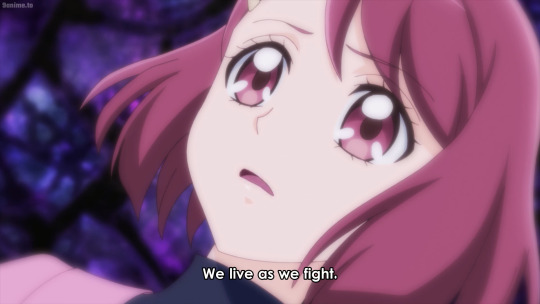
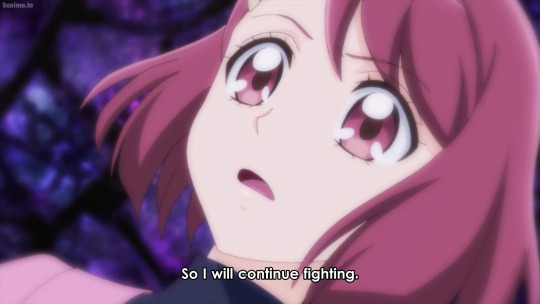
And it’s not hard to see why she’s earned such high regard in a lot of fans’ hearts.
The writers clearly worked a lot on her character composition to the point where she can pretty much embody the theme of “living is fighting” all on her own.
She came into HealPre fresh out of the hospital and full of earnest desire to make the most of her newfound freedom but she also wasn’t without knowledge on what hardship is. From there, she only got stronger, even when she was stumbling and trying to figure things out along the way. She grew more fortified in her beliefs on what it means to be truly live a healthy life.
She bravely defied the ones who attempted to take advantage of her and twist her cause against her. And she learned that taking care of herself is equally as important as wanting others to be safe from harm.
It was never about winning or coming out on top. It was about protecting a fundamental yet precious truth. That one thing any decent human being should never have to concede: the right to live well.

Honestly, Nodoka is absolutely inspiring all around, as a fictional character, a heroine and a normal everyday person.
Everything about her arc went satisfyingly right like it was meant to and the best thing is, we don’t need to question it because we saw how it all happened with our very own eyes.
I sincerely wished I could say the same for the others but sadly, they were just too flawed.
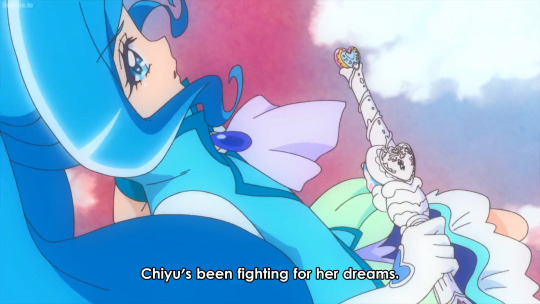
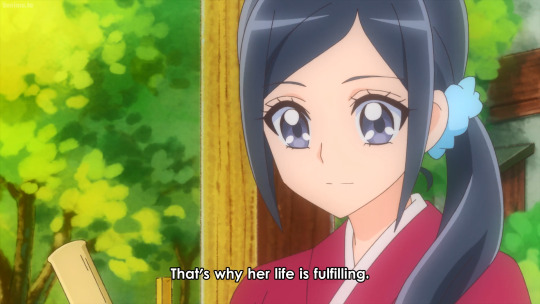
And Pegitan can throw flippers with me all day if he wants but as undeniable as the above statements are about Chiyu, her arc failed to leap over the increasingly mounting disappointment I had with every episode that’s been assigned solely to her.
Two of which weren’t even about Chiyu. One centered on Pegitan’s admiration for his partner and the other focused on her brother, Touji. Which, while nice to give to supporting/secondary characters, is a fat waste of valuable screentime and not what I’m here for.
It also didn’t help that the conflict of her arc (the indecision over choosing between two dreams) started really late in the game and was resolved so quickly within two episodes. There was no time for me to get invested into it, there was no powerful sense of conviction like how Go!Pri or Hugtto handled theirs and really, it just felt like Chiyu was only following what the script dictated for her rather than genuinely awakening to her own competitive passion towards track and field.
It was almost like it didn’t matter. Almost as if the writers procrastinated in thinking up something worthwhile to further her development...but then settled on grabbing an old idea off the shelf without refining it to suit Chiyu when they ran out of time.
This happened similarly with Minami in Go!Pri and Elena in StarPre, both of whom left me angry at how their arcs were executed. Yet theirs don’t compare to how pissed off I am about Chiyu’s. Because while Minami’s took a while to arrive, it wasn’t done poorly and linked back to Go!Pri’s theme well enough. And while Elena’s was over crammed last minute, at least it was unique to her character and had lots of potential ways to play out if they actually started it earlier on in StarPre.
Chiyu’s arc is like a discount version of the former with hardly any of the intriguing qualities of the latter. Sure, she had two early episodes that laid out the two most important aspects of her life (her family inn and her dedication to her sport) but after that, they weren’t brought up again until we were only weeks away from the ending. Y’know, just to fill up episode slots and meet the minimal requirement of saying they did give Chiyu some issue to resolve.
It was not engaging at all.

Furthermore, the fact that her arc had very little to no relation with either “health” or “nature” hurt my appreciation of her character somewhat. I just...don’t think her kind of story really matches with the central topics of HealPre?
...but maybe I’m being bitter about this all wrong and that’s screwing up my rational thinking on this matter.
Because Chiyu’s arc is valid under the logic of the overall theme, I would never say it isn’t. And again, character arcs don’t have to be close to the plot nor is it necessary to employ the “suffering builds character” method to make them interesting.
Chiyu always does her best every day. That’s sufficient argument on why her story does fit within the frame of HealPre’s premise.
Guess I’ll just have to wrangle my resistance into acceptance somehow.
...still, her arc could’ve been done so much better than what we were given. Chiyu at least deserved that much.
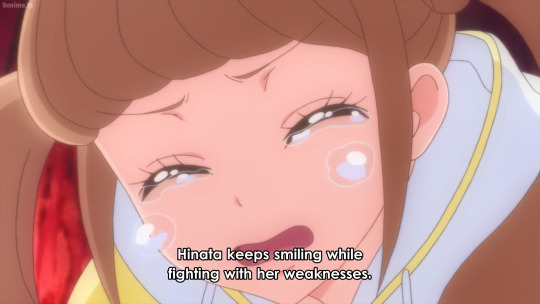
Next, Hinata.
Since the beginning, I knew she was gonna be runner-up to Nodoka for having the (for lack of better term atm) “best” arc because it was heavily implied that she has ADHD and therefore, immediately checked off the “health” trait. She was even more obvious about it than Nozomi was.
Difficulty paying attention, hyperactivity, impulsiveness. Hinata didn’t just display all those signs, she also showed how hard it was for her to deal with the downsides to them on a regular basis.
She kept apologizing and put herself down excessively for inconveniencing her friends even though they never blamed her for her condition. Got them annoyed a few times, yes, but didn’t stop them from staying friends with her and definitely didn’t make them hate her either.
Everybody was understanding of Hinata...except Hinata because she always took her failures to heart and considered quitting several times to avoid the crushing dejection of making mistakes over and over again.
She got better, though, and no one could have summed it up more heartwarmingly than Nyatoran with the encouraging words he gave her at the conclusion of her arc.
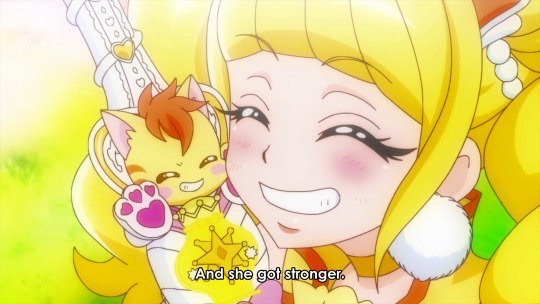
But it still feels like there’s a huge chunk of development missing between the start and finish. Or rather, it seemed like all of it occurred offscreen and we were only informed later that it did in fact, happen.
To recap, iirc, Hinata had around 5 episodes that focused on her (ep 9, 13, 23, 35 and 40). Ep 18 doesn’t count because that was a Nyatoran-centric filler more than anything.
Ep 9 and 13 did their jobs of introducing and highlighting the details of Hinata’s troubles while also suggesting she will eventually learn to overcome her insecurities. The ones after, though? They pushed those issues to the backseat.
In Ep 23, she had to share the (uneven) spotlight with Asumi. Hinata’s improvements were briefly mentioned but the majority of the ep went to teaching Asumi what “cute” meant and how to get along with puppies. I mean, I get that Asumi recently joined the group and bonding with her was mandatory by tradition. But since each Cure only gets a limited number of eps to herself, it would’ve been more beneficial for Hinata if she didn’t have to split screentime with someone else’s growth schedule.
Ep 35 is slightly better but not by a whole lot. Sure, Natasha was able to reconcile with Elizabeth which was very sweet and heck, it was the goal for that episode. But again, nothing was really done or addressed about Hinata’s main conflict. She tossed it back with the rest of her homework to deal with later. ahaha, a TroPre hint
Then ep 40 came to formally close the curtains on her story and apparently, Hinata screwed up lots of times since...whenever but she picked herself up every time after and kept on trying. Awesome. So WHY didn’t we get to see that?
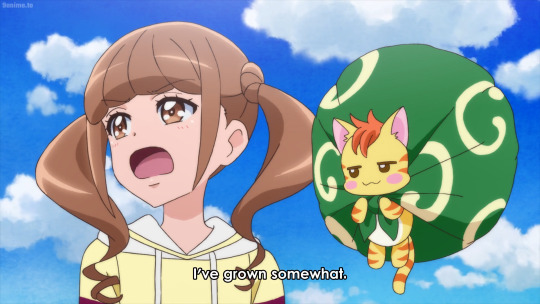
I’m not asking for the impossible here. I’m not asking for Hinata to be cured or anything miraculous like that. There is treatment available for ADHD but it is not curable.
Also, forcing Hinata to find a way to get better at studying, the thing she struggles with the most, is not the solution either because that would only make her more stressed and anxious over her own disorder.
What I want is to see how she moved from wailing “I can’t do it! I don’t wanna! I’m so scared of failing so why bother?!” to determinedly declaring “So what if I failed 1 or 100 times? So what if I fail another 1000 times? What matters is that I don’t let that stop me!”
That confidence is not something that can be built up overnight. It’s gradual and it takes numerous tries to reach from where Hinata was to where Hinata is now.
Telling me she grew emotionally stronger can only allow me to believe so much. I need to actually witness the changes as well.
If it weren’t for that, Hinata’s arc would have been a lot more impressive. Shame.
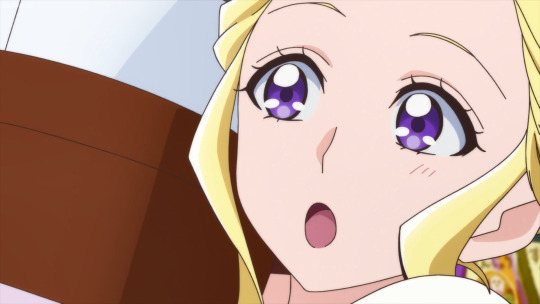
Finally............... Asumi.
Asumi, Asumi, Asumi, Asumi, Asumi, Asumi, Asumi... *sighs & drums fingers*
...she has no arc, ok? Seriously, what story is there to speak of, much less write a hefty analysis on?
A spirit born for the sake of Latte who just went along with the Precure ride because Latte didn’t want to abandon her duty. She made friends with those who aren’t Latte, extended her knowledge and understanding and gained valuable human experience during her stay on Earth. But ultimately, she will always define her entire existence around a puppy.
Nothing is more important than this puppy.
...... to be honest, Asumi not having a storyline isn’t what bothers me. It’s her lack of depth that does.
Hell, even the giant burger she ate had more depth than she did!

Oh, Asumi does have a personality alright. She’s consistently and unfailingly polite, utterly devoted to her raison d’être and in crucial moments, gives pearls of wisdom when the girls are in a pinch. She’s good.
But if that’s all she is, then she’s also painfully dull.
She has nothing to contribute to the discussion of health or nature, despite being created through an element of the Earth so you’d think she’d have an opinion of her own. At least worry about the planet that gave life to her as much as she frets over Latte all the time. But nope.
She shares the exact same face as Teatine’s past Precure partner so you’d think we’d explore that connection to see if it would influence or affect her in any way. But nope.
90% of the time, her role was just being Latte’s constant, fawning satellite.
Not only did that irritate the hell out of me but it just reinforced my stance that this type of character is one of the worst you can ever insert into any narrative.

Because if someone keeps reiterating how much they’re obsessed with this one thing and seldom talks about anything else without bringing their obsession into it... then what’s so special about them on their own?
You’ve practically surrendered the different qualities you could have had for worship of something else. That’s not a fair trade-in.
Asumi’s character is so packed with Latte-related stuff that there’s not much space left for anything that can be considered uniquely Asumi.
I mean, maybe it’s because I can never see myself or any normal person comfortable with living like that.
Living for the sake of being together with the one you love? Okay. But living with your whole universe revolving around that one thing? Making most if not all decisions based on this one thing?
No. That’s absolutely crazy, alright? Nobody with a healthy amount of awareness and self-worth would live like that.
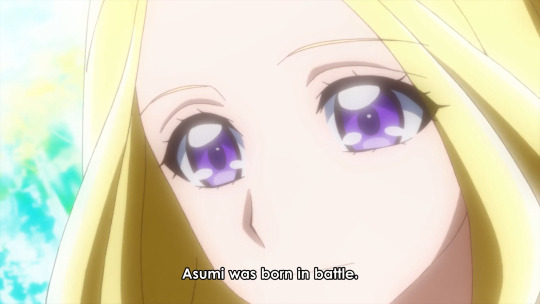
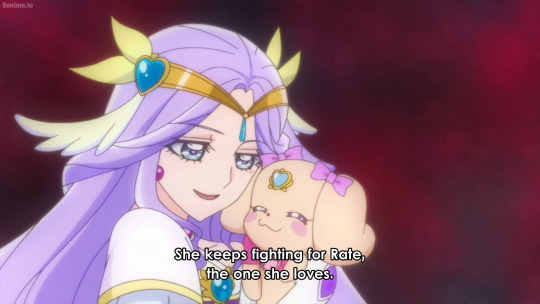
And you can counter that Asumi’s just born like that. That she can’t help her origins because Teatine’s wish to protect her daughter is essentially what brought Asumi into existence so of course, her biggest concern would be Latte. At least, she wasn’t forced into it, right? As long as Asumi chose of her own will to follow Latte, it should be fine, right?
You can even use the fact that Asumi isn’t human. That she’s a spirit and we shouldn’t apply our human standards too strictly to her.
Yea, but those are feeble defenses in the face of her being a good main character, a good main heroine.
There are many ways to make a decent MC. The way Asumi was written proves she certainly does not possess traits that can classify her as true protagonist material. A protagonist has to be more than one amplified feature, which Asumi is not.
For the record, I don’t hate Asumi (she’s not interesting enough to generate a feeling that intense). I'm just severely let down because even if I don’t end up loving the midseason Cure for whatever reason, I can usually count on them to bring something intriguing to the table to dissect and analyze. At least I should find something to care about them.
Didn’t happen with her. :(

Oh god, I’ve been working on this post for days now and I’ve got a headache and with the baton pass happening in less than a few hours as I type this, I just really need to get it done and over with so please forgive me for speeding up through the rest, I’ll try to keep it as coherent as possible. NYARGH! (@_@ ;;)
Mascots.
Would you be surprised to hear that I’m not surprised that they were actually written very well?
Like I said early on, I suspected the return of fairy partnerships were going to improve the mascots’ significance in the story and, well, I was right.
This time, they didn’t just fill in the usual expectations of relaying exposition, serving as the Cures’ transformation devices and looking cute for the merchandise. The Healing Animals had to make progress on their own training to become doctors as well.
And they did through their relationships with their human partners.

It was a refreshing take on the mascot aspect of the series because the friendships felt really symbiotic. When the trainees arrived on Earth, they relied on the girls to help them perform their jobs as well as provide them with shelter, food, the occasional peptalk about their trainee status, etc.
Then as the story continued and they got to know each other better, the mascots were able to return the favor by giving support when the Cures needed it. Rabirin when Nodoka was frightened and confused about how to deal with Daruizen, Pegitan when Chiyu was having trouble choosing between two dreams and Nyatoran who made sure to always lift Hinata’s spirits up when she got upset at herself.
In short, they achieved their objectives of learning what it means to be good doctors by being there for their friends! How wonderful! :D

My memory for Latte is hazy, unfortunately, since she’s coddled by everyone all the time (can’t blame them, she’s friggin’ adorable! <3) but I’ll never forget how she stood firm on the battlefield to see things through, to fight for the Earth like she promised her mother. She started out so babie but showed us all there was enormous bravery behind her cute face and ugh, we should all be very proud of her! <3
The only major issues I had about the mascots were these:
1) Too many irrelevant fillers went to them. They only needed a maximum of two for their entire mascot group.
2) Latte kept getting sick even after she acquired a Precure partner of her own. I was hoping it wouldn’t hurt her as much as it did before Asumi arrived or that she would build up a stronger immunity but noooo, they insisted on torturing the poor pupper! T_T

Villains + Finale Battle
Not a lot needs to be said for the first part. We’ve had mediocre antagonists before. HealPre’s just happened to be extra annoying as they were despicable.
Which is worse because jerks you can just leave in the trash but assholes won’t stop harassing you unless you pummel them into their graves, set fire to their corpses and leave no trace of them behind! >:(
Y’all know who I’m talking about. Opinions on him continue to vary depending on who you talk to and if they’re avid fans of his face or not but whatever. The son of a bitch served his purpose and is dead now. That’s all that matters to me.
Anyway, the King was flat like his two lesser generals. He was neither intimidating nor distinguished enough in the brand of evil to really make us think of him as a serious threat and because of that, it ended up making the boss fight look like any run of the mill boss fight.
I know, they tried so hard with all that shiny animation but it just didn’t have that glorious sense of vindication that previous seasons (or ep 42) gave and I blame it all on this Rumiko Takahashi reject.
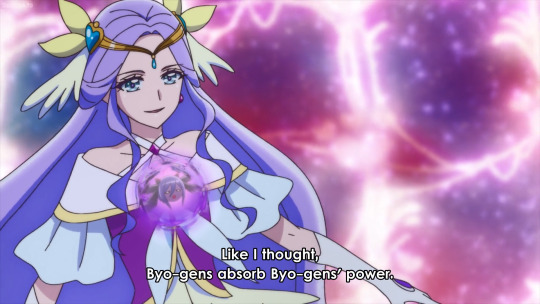
Also, this strategy was pretty useless?
They built it up like Earth was gonna sacrifice herself and die or something (she wouldn’t and even if she came close, deus ex machina would’ve kicked in to prevent that and COVID-induced caution too I guess).
But there were no signs of pain (well, that’s a relief) after absorbing Shindoi-ne and they really pissed King Byogen off more than they did any damage with the absorbed byo-gen power.
...so yea, this tactic was just to kill some time and budget, nothing more. Meh.
By the way, did Asumi eject Shindoi-ne’s pathogen out of her body yet or did they just leave it in there to bounce around until it eventually dissolves on its own?
Because that’s eww. I mean, it’s obviously not gonna hurt Asumi they can both relate on hyperfocusing their affection for someone so maybe the compatibility helps :P but still, ewwwww.
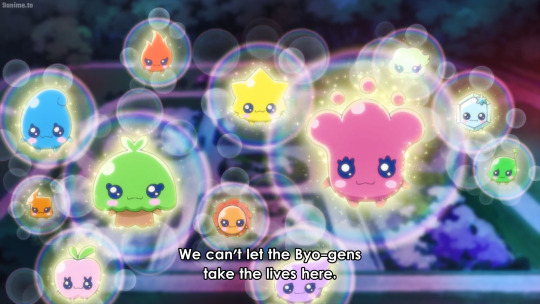
Fillers + Underused Motifs
In hindsight, perhaps HealPre didn’t exactly promise the content we I wanted about “health” and “nature” if their objective was to teach that any manner of “fighting” can count towards “living”.
......but fuck you Toei, you’re still cowards! >:/
Fillers will be fillers but it’s always better to try and make some of them as meaningful as possible. And they wasted the opportunity to inform an impressionable audience (during a very crucial period of our time, I must add) on a lot of things related to the HealPre’s motifs. Especially about the environment which for some ridiculous reason, they chose not to touch on for the main stretch of the overall story.
Proper hygiene, good diet plan and sleeping habits, regular exercise (already done by the girls a few times but could use another example), meditation, counseling/therapy (especially for mental health!), etc.
Real life pollution, climate change/global warming (IMPORTANT!!), deforestation, preservation vs conservation, endangered species, recycling, volunteering to clean up your community, etc.
These just came off the top of my head but yes, there’s more and no, I’m not saying that the writers need to cover all of them in extreme detail or replace the slice-of-life episodes.
But they should be able to mesh both serious and light-hearted together in harmony somehow. Like those fillers where the mascots saw people cleaning up littering at the park or that interaction with that arborist who taught them about wild animals and trees when the group went to visit a lake.
For health, maybe let the girls visit patients with chronic illness in the hospital or have them converse with a medical professional on some matter. Particularly if it’s got something to do with mental illness because stigma in Japan on those who are afflicted with such conditions is still prevalent and has caused a number of sad and shocking tragedies that could have otherwise been avoided if people didn’t have such outdated, judgmental mindsets.
That last part might be too dark for a children’s anime but there’s a lot more out there that is doable.
Do that without reducing it into a footnote, Toei. It is so necessary for your target audience to be aware of these issues at the age they are now. You have an almost 20-year old franchise to serve as a very effective platform. Make better use of it if you truly care about the message you’re conveying through your show!
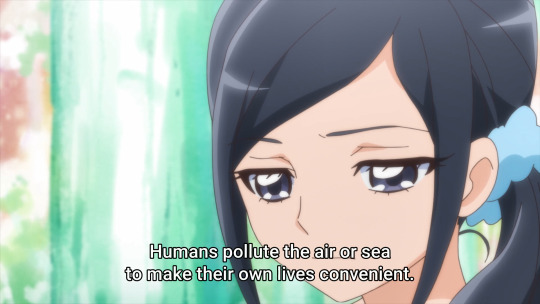

Also, what the fuck.
The last episode was a mess. Why are you only mentioning this now when the season is already over?
This should’ve been brought up months ago!
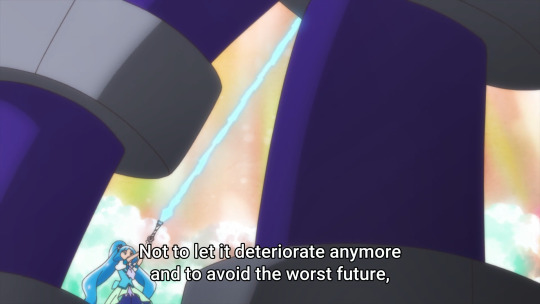
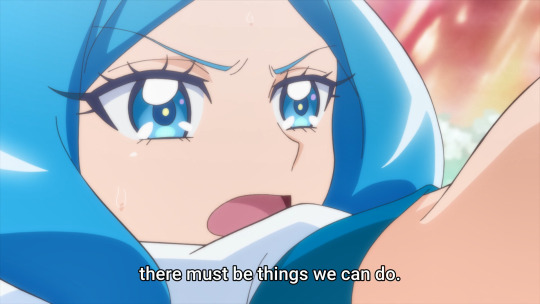
All the things we could’ve seen the Cures done to protect the Earth without magic.
The excuse of “I didn’t know humans were so horrible!” is a shit one because everybody knows humans are deplorable trash when it comes to abusing the Earth. All the more reason why you have to persistently drill it into people’s heads that they should not be like those who don’t care or choose not to care.
One crack episode isn’t going to cut that.
God, I so want to unsee this ep just so I don’t have to end HealPre on a more sour note than it already was. *big aggrieved sigh*
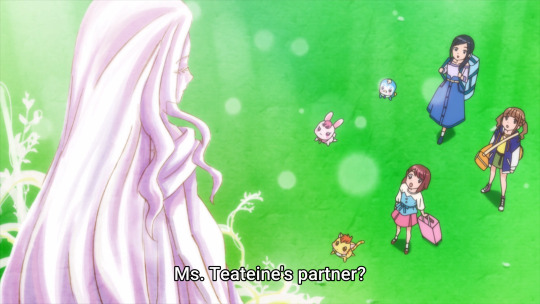
Lastly (and this really is the end of my long ranting, I promise), the missing undisclosed lore.
There are few Precure seasons without a past lore of its own in the recent years. Is it a wonder, though?
Lore is mysterious and fascinating. If it involves a past Precure, even more so.
Sometimes fans might just hang onto a show because they’re curious about what happened before the main story. We’d never get the full tale of those adventures but at least, it’s fun to imagine the “prequel”.
Also, past Precure are just badass. Fact.
Strangely enough, we didn’t get that for Heal. All we know is that she was called “Fuu” and was very close to Teatine.
Hmm. Probably one of those changes caused by COVID interference cuz I can’t imagine the writers choosing not to tell her past in the original draft.

With all that finally off my chest, I’m ready to part ways with you girls until the next All Stars (Nodoka, I’m gonna miss you so much! T_T)
HealPre wasn’t the worst and it was nowhere near the best that it had the potential to be. But it’s passable. At least for those who loved it even with its flaws, I’m genuinely glad it was good for you.
For those who are thinking about picking it up (although why you would read this spoilery post before watching, I have no idea), if you’re looking for a standard magical girl anime to enjoy casually, then this is a safe pick. If you really want to invest your attention and heart into it, though? Then perhaps it would be in your interest to ask someone who saw it already to help you filter out the episodes that are worth watching. You don’t need to worry about the rest, they’re inconsequential. :P
Ok then! Thanks for reading as always, brave souls who have reached this point.
Stay healthy and safe out there and I’ll see you at the beach next week! Tropic underwater paradise here we coooooommmmmeeeeee!!!!!!!!!!!! xDDD
#i rage quit two drafts and an outline before i got anywhere with this#now if you'll excuse me i gotta catch up on my workout and play pokemon and eat pho later#and catch up on the ccs manga#livin' the healthy life oh yea~#healin' good precure#cure grace#cure fontaine#cure sparkle#cure earth#hanadera nodoka#sawaizumi chiyu#hiramitsu hinata#fuurin asumi#rabirin#pegitan#nyatoran#latte
10 notes
·
View notes
Text
The Murders in the Rue Morgue
Edgar Allan Poe (1841)
What song the Syrens sang, or what name Achilles assumed when he hid himself among women, although puzzling questions are not beyond all conjecture. --SIR THOMAS BROWNE, Urn-Burial.
THE mental features discoursed of as the analytical, are, in themselves, but little susceptible of analysis. We appreciate them only in their effects. We know of them, among other things, that they are always to their possessor, when inordinately possessed, a source of the liveliest enjoyment. As the strong man exults in his physical ability, delighting in such exercises as call his muscles into action, so glories the analyst in that moral activity which disentangles. He derives pleasure from even the most trivial occupations bringing his talents into play. He is fond of enigmas, of conundrums, of hieroglyphics; exhibiting in his solutions of each a degree of acumen which appears to the ordinary apprehension preternatural. His results, brought about by the very soul and essence of method, have, in truth, the whole air of intuition. The faculty of re-solution is possibly much invigorated by mathematical study, and especially by that highest branch of it which, unjustly, and merely on account of its retrograde operations, has been called, as if par excellence, analysis. Yet to calculate is not in itself to analyze. A chess-player, for example, does the one without effort at the other. It follows that the game of chess, in its effects upon mental character, is greatly misunderstood. I am not now writing a treatise, but simply prefacing a somewhat peculiar narrative by observations very much at random; I will, therefore, take occasion to assert that the higher powers of the reflective intellect are more decidedly and more usefully tasked by the unostentatious game of draughts than by all the elaborate frivolity of chess. In this latter, where the pieces have different and bizarre motions, with various and variable values, what is only complex is mistaken (a not unusual error) for what is profound. The attention is here called powerfully into play. If it flag for an instant, an oversight is committed, resulting in injury or defeat. The possible moves being not only manifold but involute, the chances of such oversights are multiplied; and in nine cases out of ten it is the more concentrative rather than the more acute player who conquers. In draughts, on the contrary, where the moves are unique and have but little variation, the probabilities of inadvertence are diminished, and the mere attention being left comparatively what advantages are obtained by either party are obtained by superior acumen. To be less abstract --Let us suppose a game of draughts where the pieces are reduced to four kings, and where, of course, no oversight is to be expected. It is obvious that here the victory can be decided (the players being at all equal) only by some recherche movement, the result of some strong exertion of the intellect. Deprived of ordinary resources, the analyst throws himself into the spirit of his opponent, identifies himself therewith, and not unfrequently sees thus, at a glance, the sole methods (sometimes indeed absurdly simple ones) by which he may seduce into error or hurry into miscalculation.
Whist has long been noted for its influence upon what is termed the calculating power; and men of the highest order of intellect have been known to take an apparently unaccountable delight in it, while eschewing chess as frivolous. Beyond doubt there is nothing of a similar nature so greatly tasking the faculty of analysis. The best chess-player in Christendom may be little more than the best player of chess; but proficiency in whist implies capacity for success in all these more important undertakings where mind struggles with mind. When I say proficiency, I mean that perfection in the game which includes a comprehension of all the sources whence legitimate advantage may be derived. These are not only manifold but multiform, and lie frequently among recesses of thought altogether inaccessible to the ordinary understanding. To observe attentively is to remember distinctly; and, so far, the concentrative chess-player will do very well at whist; while the rules of Hoyle (themselves based upon the mere mechanism of the game) are sufficiently and generally comprehensible. Thus to have a retentive memory, and to proceed by "the book," are points commonly regarded as the sum total of good playing. But it is in matters beyond the limits of mere rule that the skill of the analyst is evinced. He makes, in silence, a host of observations and inferences. So, perhaps, do his companions; and the difference in the extent of the information obtained, lies not so much in the validity of the inference as in the quality of the observation. The necessary knowledge is that of what to observe. Our player confines himself not at all; nor, because the game is the object, does he reject deductions from things external to the game. He examines the countenance of his partner, comparing it carefully with that of each of his opponents. He considers the mode of assorting the cards in each hand; often counting trump by trump, and honor by honor, through the glances bestowed by their holders upon each. He notes every variation of face as the play progresses, gathering a fund of thought from the differences in the expression of certainty, of surprise, of triumph, or chagrin. From the manner of gathering up a trick he judges whether the person taking it can make another in the suit. He recognizes what is played through feint, by the air with which it is thrown upon the table. A casual or inadvertent word; the accidental dropping or turning of a card, with the accompanying anxiety or carelessness in regard to its concealment; the counting of the tricks, with the order of their arrangement; embarrassment, hesitation, eagerness or trepidation --all afford, to his apparently intuitive perception, indications of the true state of affairs. The first two or three rounds having been played, he is in full possession of the contents of each hand, and thenceforward puts down his cards with as absolute a precision of purpose as if the rest of the party had turned outward the faces of their own.
The analytical power should not be confounded with simple ingenuity; for while the analyst is necessarily ingenious, the ingenious man often remarkably incapable of analysis. The constructive or combining power, by which ingenuity is usually manifested, and which the phrenologists (I believe erroneously) have assigned a separate organ, supposing it a primitive faculty, has been so frequently seen in those whose intellect bordered otherwise upon idiocy, as to have attracted general observation among writers on morals. Between ingenuity and the analytic ability there exists a difference far greater, indeed, than that between the fancy and the imagination, but of a character very strictly analogous. It will found, in fact, that the ingenious are always fanciful, and the truly imaginative never otherwise than analytic.
The narrative which follows will appear to the reader somewhat in the light of a commentary upon the propositions just advanced.
Residing in Paris during the spring and part of the summer of 18--, I there became acquainted with a Monsieur C. Auguste Dupin. This young gentleman was of an excellent --indeed of an illustrious family, but, by a variety of untoward events, had been reduced to such poverty that the energy of his character succumbed beneath it, and he ceased to bestir himself in the world, or to care for the retrieval of his fortunes. By courtesy of his creditors, there still remained in his possession a small remnant of his patrimony; and, upon the income arising from this, he managed, by means of a rigorous economy, to procure the necessaries of life, without troubling himself about its superfluities. Books, indeed, were his sole luxuries, and in Paris these are easily obtained. Our first meeting was at an obscure library in the Rue Montmartre, where the accident of our both being in search of the same very rare and very remarkable volume, brought us into closer communion. We saw each other again and again. I was deeply interested in the little family history which he detailed to me with all that candor which a Frenchman indulges whenever mere self is the theme. I was astonished, too, at the vast extent of his reading; and, above all, I felt my soul enkindled within me by the wild fervor, and the vivid freshness of his imagination. Seeking in Paris the objects I then sought, I felt that the society of such a man would be to me a treasure beyond price; and this feeling I frankly confided to him. It was at length arranged that we should live together during my stay in the city; and as my worldly circumstances were somewhat less embarrassed than his own, I was permitted to be at the expense of renting, and furnishing in a style which suited the rather fantastic gloom of our common temper, a time-eaten and grotesque mansion, long deserted through superstitions into which we did not inquire, and tottering to its fall in a retired and desolate portion of the Faubourg St. Germain.
Had the routine of our life at this place been known to the world, we should have been regarded as madmen --although, perhaps, as madmen of a harmless nature. Our seclusion was perfect. We admitted no visitors. Indeed the locality of our retirement had been carefully kept a secret from my own former associates; and it had been many years since Dupin had ceased to know or be known in Paris. We existed within ourselves alone.
It was a freak of fancy in my friend (for what else shall I call it?) to be enamored of the Night for her own sake; and into this bizarrerie, as into all his others, I quietly fell; giving myself up to his wild whims with a perfect abandon. The sable divinity would not herself dwell with us always; but we could counterfeit her presence. At the first dawn of the morning we closed all the massy shutters of our old building; lighted a couple of tapers which, strongly perfumed, threw out only the ghastliest and feeblest of rays. By the aid of these we then busied our souls in dreams --reading, writing, or conversing, until warned by the clock of the advent of the true Darkness. Then we sallied forth into the streets, arm and arm, continuing the topics of the day, or roaming far and wide until a late hour, seeking, amid the wild lights and shadows of the populous city, that infinity of mental excitement which quiet observation can afford.
At such times I could not help remarking and admiring (although from his rich ideality I had been prepared to expect it) a peculiar analytic ability in Dupin. He seemed, too, to take an eager delight in its exercise --if not exactly in its display --and did not hesitate to confess the pleasure thus derived. He boasted to me, with a low chuckling laugh, that most men, in respect to himself, wore windows in their bosoms, and was wont to follow up such assertions by direct and very startling proofs of his intimate knowledge of my own. His manner at these moments was frigid and abstract; his eyes were vacant in expression; while his voice, usually a rich tenor, rose into a treble which would have sounded petulantly but for the deliberateness and entire distinctness of the enunciation. Observing him in these moods, I often dwelt meditatively upon the old philosophy of the Bi-Part Soul, and amused myself with the fancy of a double Dupin --the creative and the resolvent.
Let it not be supposed, from what I have just said, that I am detailing any mystery, or penning any romance. What I have described in the Frenchman, was merely the result of an excited, or perhaps of a diseased intelligence. But of the character of his remarks at the periods in question an example will best convey the idea.
We were strolling one night down a long dirty street, in the vicinity of the Palais Royal. Being both, apparently, occupied with thought, neither of us had spoken a syllable for fifteen minutes at least. All at once Dupin broke forth with these words:-
"He is a very little fellow, that's true, and would do better for the Theatre des Varietes."
"There can be no doubt of that," I replied unwittingly, and not at first observing (so much had I been absorbed in reflection) the extraordinary manner in which the speaker had chimed in with my meditations. In an instant afterward I recollected myself, and my astonishment was profound.
"Dupin," said I, gravely, "this is beyond my comprehension. I do not hesitate to say that I am amazed, and can scarcely credit my senses. How was it possible you should know I was thinking of --?" Here I paused, to ascertain beyond a doubt whether he really knew of whom I thought.
--"of Chantilly," said he, "why do you pause? You were remarking to yourself that his diminutive figure unfitted him for tragedy."
This was precisely what had formed the subject of my reflections. Chantilly was a quondam cobbler of the Rue St. Denis, who, becoming stage-mad, had attempted the role of Xerxes, in Crebillon's tragedy so called, and been notoriously Pasquinaded for his pains.
"Tell me, for Heaven's sake," I exclaimed, "the method --if method there is --by which you have been enabled to fathom my soul in this matter." In fact I was even more startled than I would have been willing to express.
"It was the fruiterer," replied my friend, "who brought you to the conclusion that the mender of soles was not of sufficient height for Xerxes et id genus omne."
"The fruiterer! --you astonish me --I know no fruiterer whomsoever."
"The man who ran up against you as we entered the street --it may have been fifteen minutes ago."
I now remembered that, in fact, a fruiterer, carrying upon his head a large basket of apples, had nearly thrown me down, by accident, as we passed from the Rue C-- into the thoroughfare where we stood; but what this had to do with Chantilly I could not possibly understand.
There was not a particle of charlatanerie about Dupin. "I will explain," he said, "and that you may comprehend all clearly, we will explain," he said, "and that you may comprehend all clearly, we will first retrace the course of your meditations, from the moment in which I spoke to you until that of the rencontre with the fruiterer in question. The larger links of the chain run thus --Chantilly, Orion, Dr. Nichols, Epicurus, Stereotomy, the street stones, the fruiterer."
There are few persons who have not, at some period of their lives, amused themselves in retracing the steps by which particular conclusions of their own minds have been attained. The occupation is often full of interest; and he who attempts it for the first time is astonished by the apparently illimitable distance and incoherence between the starting-point and the goal. What, then, must have been my amazement when I heard the Frenchman speak what he had just spoken, and when I could not help acknowledging that he had spoken the truth. He continued:
"We had been talking of horses, if I remember aright, just before leaving the Rue C--. This was the last subject we discussed. As we crossed into this street, a fruiterer, with a large basket upon his head, brushing quickly past us, thrust you upon a pile of paving-stones collected at a spot where the causeway is undergoing repair. You stepped upon one of the loose fragments) slipped, slightly strained your ankle, appeared vexed or sulky, muttered a few words, turned to look at the pile, and then proceeded in silence. I was not particularly attentive to what you did; but observation has become with me, of late, a species of necessity.
"You kept your eyes upon the ground --glancing, with a petulant expression, at the holes and ruts in the pavement, (so that I saw you were still thinking of the stones,) until we reached the little alley called Lamartine, which has been paved, by way of experiment, with the overlapping and riveted blocks. Here your countenance brightened up, and, perceiving your lips move, I could not doubt that you murmured the word 'stereotomy,' a term very affectedly applied to this species of pavement. I knew that you could not say to yourself 'stereotomy' without being brought to think of atomies, and thus of the theories of Epicurus; and since, when we discussed this subject not very long ago, I mentioned to you how singularly, yet with how little notice, the vague guesses of that noble Greek had met with confirmation in the late nebular cosmogony, I felt that you could not avoid casting your eyes upward to the great nebula in Orion, and I certainly expected that you would do so. You did look up; and I was now assured that I had correctly followed your steps. But in that bitter tirade upon Chantilly, which appeared in yesterday's 'Musee,' the satirist, making some disgraceful allusions to the cobbler's change of name upon assuming the buskin, quoted a Latin line about which we have often conversed. I mean the line
Perdidit antiquum litera prima sonum.
I had told you that this was in reference to Orion, formerly written Urion; and, from certain pungencies connected with this explanation, I was aware that you could not have forgotten it. It was clear, therefore, that you would not fall to combine the ideas of Orion and Chantilly. That you did combine them I say by the character of the smile which passed over your lips. You thought of the poor cobbler's immolation. So far, you had been stooping in your gait; but now I saw you draw yourself up to your full height. I was then sure that you reflected upon the diminutive figure of Chantilly. At this point I interrupted your meditations to remark that as, in fact, he was a very little fellow --that Chantilly --he would do better at the Theatre des Varietes."
Not long after this, we were looking over an evening edition of the "Gazette des Tribunaux," when the following paragraphs arrested our attention.
"Extraordinary Murders. --This morning, about three o'clock, the inhabitants of the Quartier St. Roch were aroused from sleep by a succession of terrific shrieks, issuing, apparently, from the fourth story of a house in the Rue Morgue, known to be in the sole occupancy of one Madame L'Espanaye, and her daughter, Mademoiselle Camille L'Espanaye. After some delay, occasioned by a fruitless attempt to procure admission in the usual manner, the gateway was broken in with a crowbar, and eight or ten of the neighbors entered, accompanied by two gendarmes. By this time the cries had ceased; but, as the party rushed up the first flight of stairs, two or more rough voices, in angry contention, were distinguished, and seemed to proceed from the upper part of the house. As the second landing was reached, these sounds, also, had ceased, and everything remained perfectly quiet. The party spread themselves, and hurried from room to room. Upon arriving at a large back chamber in the fourth story, (the door of which, being found locked, with the key inside, was forced open,) a spectacle presented itself which struck every one present not less with horror than with astonishment.
"The apartment was in the wildest disorder --the furniture broken and thrown about in all directions. There was only one bedstead; and from this the bed had been removed, and thrown into the middle of the floor. On a chair lay a razor, besmeared with blood. On the hearth were two or three long and thick tresses of grey human hair, also dabbled in blood, and seeming to have been pulled out by the roots. Upon the floor were found four Napoleons, an ear-ring of topaz, three large silver spoons, three smaller of metal d'Alger, and two bags, containing nearly four thousand francs in gold. The drawers of a bureau, which stood in one corner, were open, and had been, apparently, rifled, although many articles still remained in them. A small iron safe was discovered under the bed (not under the bedstead). It was open, with the key still in the door. It had no contents beyond a few old letters, and other papers of little consequence.
"Of Madame L'Espanaye no traces were here seen; but an unusual quantity of soot being observed in the fire-place, a search was made in the chimney, and (horrible to relate!) the corpse of the daughter, head downward, was dragged therefrom; it having been thus forced up the narrow aperture for a considerable distance. The body was quite warm. Upon examining it, many excoriations were perceived, no doubt occasioned by the violence with which it had been thrust up and disengaged. Upon the face were many severe scratches, and, upon the throat, dark bruises, and deep indentations of finger nails, as if the deceased had been throttled to death.
"After a thorough investigation of every portion of the house, without farther discovery, the party made its way into a small paved yard in the rear of the building, where lay the corpse of the old lady, with her throat so entirely cut that, upon an attempt to raise her, the head fell off. The body, as well as the head, was fearfully mutilated --the former so much so as scarcely to retain any semblance of humanity.
"To this horrible mystery there is not as yet, we believe, the slightest clew."
The next day's paper had these additional particulars.
"The Tragedy in the Rue Morgue. Many individuals have been examined in relation to this most extraordinary and frightful affair," [The word 'affaire' has not yet, in France, that levity of import which it conveys with us] "but nothing whatever has transpired to throw light upon We give below all the material testimony elicited.
"Pauline Dubourg, laundress, deposes that she has known both the deceased for three years, having washed for them during that period. The old lady and her daughter seemed on good terms-very affectionate towards each other. They were excellent pay. Could not speak in regard to their mode or means of living. Believed that Madame L. told fortunes for a living. Was reputed to have money put by. Never met any persons in the house when she called for the clothes or took them home. Was sure that they had no servant in employ. There appeared to be no furniture in any part of the building except in the fourth story.
"Pierre Moreau, tobacconist, deposes that he has been in the habit of selling small quantities of tobacco and snuff to Madame L'Espanaye for nearly four years. Was born in the neighborhood, and has always resided there. The deceased and her daughter had occupied the house in which the corpses were found, for more than six years. It was formerly occupied by a jeweller, who under-let the upper rooms to various persons. The house was the property of Madame L. She became dissatisfied with the abuse of the premises by her tenant, and moved into them herself, refusing to let any portion. The old lady was childish. Witness had seen the daughter some five or six times during the six years. The two lived an exceedingly retired life --were reputed to have money. Had heard it said among the neighbors that Madame L. told fortunes --did not believe it. Had never seen any person enter the door except the old lady and her daughter, a porter once or twice, and a physician some eight or ten times.
"Many other persons, neighbors, gave evidence to the same effect. No one was spoken of as frequenting the house. It was not known whether there were any living connexions of Madame L. and her daughter. The shutters of the front windows were seldom opened. Those in the rear were always closed, with the exception of the large back room, fourth story. The house was a good house --not very old.
"Isidore Muset, gendarme, deposes that he was called to the house about three o'clock in the morning, and found some twenty or thirty persons at the gateway, endeavoring to gain admittance. Forced it open, at length, with a bayonet --not with a crowbar. Had but little difficulty in getting it open, on account of its being a double or folding gate, and bolted neither at bottom nor top. The shrieks were continued until the gate was forced --and then suddenly ceased. They seemed to be screams of some person (or persons) in great agony --were loud and drawn out, not short and quick. Witness led the way up stairs. Upon reaching the first landing, heard two voices in loud and angry contention-the one a gruff voice, the other much shriller --a very strange voice. Could distinguish some words of the former, which was that of a Frenchman. Was positive that it was not a woman's voice. Could distinguish the words 'sacre' and 'diable.' The shrill voice was that of a foreigner. Could not be sure whether it was the voice of a man or of a woman. Could not make out what was said, but believed the language to be Spanish. The state of the room and of the bodies was described by this witness as we described them yesterday.
"Henri Duval, a neighbor, and by trade a silversmith, deposes that he was one of the party who first entered the house. Corroborates the testimony of Muset in general. As soon as they forced an entrance, they reclosed the door, to keep out the crowd, which collected very fast, notwithstanding the lateness of the hour. The shrill voice, the witness thinks, was that of an Italian. Was certain it was not French. Could not be sure that it was a man's voice. It might have been a woman's. Was not acquainted with the Italian language. Could not distinguish the words, but was convinced by the intonation that the speaker was an Italian. Knew Madame L. and her daughter. Had conversed with both frequently. Was sure that the shrill voice was not that of either of the deceased. "--Odenheimer, restaurateur. This witness volunteered his testimony. Not speaking French, was examined through an interpreter. Is a native of Amsterdam. Was passing the house at the time of the shrieks. They lasted for several minutes --probably ten. They were long and loud --very awful and distressing. Was one of those who entered the building. Corroborated the previous evidence in every respect but one. Was sure that the shrill voice was that of a man --of a Frenchman. Could not distinguish the words uttered. They were loud and quick --unequal --spoken apparently in fear as well as in anger. The voice was harsh --not so much shrill as harsh. Could not call it a shrill voice. The gruff voice said repeatedly 'sacre,' 'diable' and once 'mon Dieu.'
"Jules Mignaud, banker, of the firm of Mignaud et Fils, Rue Deloraine. Is the elder Mignaud. Madame L'Espanaye had some property. Had opened an account with his baking house in the spring of the year --(eight years previously). Made frequent deposits in small sums. Had checked for nothing until the third day before her death, when she took out in person the sum of 4000 francs. This sum was paid in gold, and a clerk sent home with the money.
"Adolphe Le Bon, clerk to Mignaud et Fils, deposes that on the day in question, about noon, he accompanied Madame L'Espanaye to her residence with the 4000 francs, put up in two bags. Upon the door being opened, Mademoiselle L. appeared and took from his hands one of the bags, while the old lady relieved him of the other. He then bowed and departed. Did not see any person in the street at the time. It is a bye-street --very lonely.
William Bird, tailor, deposes that he was one of the party who entered the house. Is an Englishman. Has lived in Paris two years. Was one of the first to ascend the stairs. Heard the voices in contention. The gruff voice was that of a Frenchman. Could make out several words, but cannot now remember all. Heard distinctly 'sacre' and 'mon Dieu.' There was a sound at the moment as if of several persons struggling --a scraping and scuffling sound. The shrill voice was very loud --louder than the gruff one. Is sure that it was not the voice of an Englishman. Appeared to be that of a German. Might have been a woman's voice. Does not understand German.
"Four of the above-named witnesses, being recalled, deposed that the door of the chamber in which was found the body of Mademoiselle L. was locked on the inside when the party reached it. Every thing was perfectly silent --no groans or noises of any kind. Upon forcing the door no person was seen. The windows, both of the back and front room, were down and firmly fastened from within. A door between the two rooms was closed, but not locked. The door leading from the front room into the passage was locked, with the key on the inside. A small room in the front of the house, on the fourth story, at the head of the passage, was open, the door being ajar. This room was crowded with old beds, boxes, and so forth. These were carefully removed and searched. There was not an inch of any portion of the house which was not carefully searched. Sweeps were sent up and down the chimneys. The house was a four story one, with garrets (mansardes). A trap-door on the roof was nailed down very securely --did not appear to have been opened for years. The time elapsing between the hearing of the voices in contention and the breaking open of the room door, was variously stated by the witnesses. Some made it as short as three minutes --some as long as five. The door was opened with difficulty.
"Alfonzo Garcio, undertaker, deposes that he resides in the Rue Morgue. Is a native of Spain. Was one of the party who entered the house. Did not proceed up stairs. Is nervous, and was apprehensive of the consequences of agitation. Heard the voices in contention. The gruff voice was that of a Frenchman. Could not distinguish what was said. The shrill voice was that of an Englishman --is sure of this. Does not understand the English language, but judges by the intonation.
"Alberto Montani, confectioner, deposes that he was among the first to ascend the stairs. Heard the voices in question. The gruff voice was that of a Frenchman. Distinguished several words. The speaker appeared to be expostulating. Could not make out the words of the shrill voice. Spoke quick and unevenly. Thinks it the voice of a Russian. Corroborates the general testimony. Is an Italian. Never conversed with a native of Russia.
"Several witnesses, recalled, here testified that the chimneys of all the rooms on the fourth story were too narrow to admit the passage of a human being. By 'sweeps' were meant cylindrical sweeping-brushes, such as are employed by those who clean chimneys. These brushes were passed up and down every flue in the house. There is no back passage by which any one could have descended while the party proceeded up stairs. The body of Mademoiselle L'Espanaye was so firmly wedged in the chimney that it could not be got down until four or five of the party united their strength.
"Paul Dumas, physician, deposes that he was called to view the bodies about day-break. They were both then lying on the sacking of the bedstead in the chamber where Mademoiselle L. was found. The corpse of the young lady was much bruised and excoriated. The fact that it had been thrust up the chimney would sufficiently account for these appearances. The throat was greatly chafed. There were several deep scratches just below the chin, together with a series of livid spots which were evidently the impression of fingers. The face was fearfully discolored, and the eye-balls protruded. The tongue had been partially bitten through. A large bruise was discovered upon the pit of the stomach, produced, apparently, by the pressure of a knee. In the opinion of M. Dumas, Mademoiselle L'Espanaye had been throttled to death by some person or persons unknown. The corpse of the mother was horribly mutilated. All the bones of the right leg and arm were more or less shattered. The left tibia much splintered, as well as all the ribs of the left side. Whole body dreadfully bruised and discolored. It was not possible to say how the injuries had been inflicted. A heavy club of wood, or a broad bar of iron --a chair --any large, heavy, and obtuse weapon have produced such results, if wielded by the hands of a very powerful man. No woman could have inflicted the blows with any weapon. The head of the deceased, when seen by witness, was entirely separated from the body, and was also greatly shattered. The throat had evidently been cut with some very sharp instrument --probably with a razor.
"Alexandre Etienne, surgeon, was called with M. Dumas to view the bodies. Corroborated the testimony, and the opinions of M. Dumas.
"Nothing farther of importance was elicited, although several other persons were examined. A murder so mysterious, and so perplexing in all its particulars, was never before committed in Paris --if indeed a murder has been committed at all. The police are entirely at fault --an unusual occurrence in affairs of this nature. There is not, however, the shadow of a clew apparent."
The evening edition of the paper stated that the greatest excitement continued in the Quartier St. Roch --that the premises in question had been carefully re-searched, and fresh examinations of witnesses instituted, but all to no purpose. A postscript, however mentioned that Adolphe Le Bon had been arrested and imprisoned --although nothing appeared to criminate him, beyond the facts already detailed. Dupin seemed singularly interested in the progress of this affair --at least so I judged from his manner, for he made no comments. It was only after the announcement that Le Bon had been imprisoned, that he asked me my opinion respecting the murders.
I could merely agree with all Paris in considering them an insoluble mystery. I saw no means by which it would be possible to trace the murderer.
"We must not judge of the means," said Dupin, "by this shell of an examination. The Parisian police, so much extolled for acumen, are cunning, but no more. There is no method in their proceedings, beyond the method of the moment. They make a vast parade of measures; but, not unfrequently, these are so ill adapted to the objects proposed, as to put us in mind of Monsieur Jourdain's calling for his robe-de-chambre --pour mieux entendre la musique. The results attained by them are not unfrequently surprising, but, for the most part, are brought about by simple diligence and activity. When these qualities are unavailing, their schemes fall. Vidocq, for example, was a good guesser, and a persevering man. But, without educated thought, he erred continually by the very intensity of his investigations. He impaired his vision by holding the object too close. He might see, perhaps, one or two points with unusual clearness, but in so doing he, necessarily, lost sight of the matter as a whole. Thus there is such a thing as being too profound. Truth is not always in a well. In fact, as regards the more important knowledge, I do believe that she is invariably superficial. The depth lies in the valleys where we seek her, and not upon the mountain-tops where she is found. The modes and sources of this kind of error are well typified in the contemplation of the heavenly bodies. To look at a star by glances --to view it in a side-long way, by turning toward it the exterior portions of the retina (more susceptible of feeble impressions of light than the interior), is to behold the star distinctly --is to have the best appreciation of its lustre --a lustre which grows dim just in proportion as we turn our vision fully upon it. A greater number of rays actually fall upon the eye in the latter case, but, in the former, there is the more refined capacity for comprehension. By undue profundity we perplex and enfeeble thought; and it is possible to make even Venus herself vanish from the firmament by a scrutiny too sustained, too concentrated, or too direct.
"As for these murders, let us enter into some examinations for ourselves, before we make up an opinion respecting them. An inquiry will afford us amusement," (I thought this an odd term, so applied, but said nothing) "and, besides, Le Bon once rendered me a service for which I am not ungrateful. We will go and see the premises with our own eyes. I know G--, the Prefect of Police, and shall have no difficulty in obtaining the necessary permission."
The permission was obtained, and we proceeded at once to the Rue Morgue. This is one of those miserable thoroughfares which intervene between the Rue Richelieu and the Rue St. Roch. It was late in the afternoon when we reached it; as this quarter is at a great distance from that in which we resided. The house was readily found; for there were still many persons gazing up at the closed shutters, with an objectless curiosity, from the opposite side of the way. It was an ordinary Parisian house, with a gateway, on one side of which was a glazed watch-box, with a sliding way, on one si panel in the window, indicating a loge de concierge. Before going in we walked up the street, turned down an alley, and then, again turning, passed in the rear of the building-Dupin, meanwhile, examining the whole neighborhood, as well as the house, with a minuteness of attention for which I could see no possible object. Retracing our steps, we came again to the front of the dwelling, rang, and, having shown our credentials, were admitted by the agents in charge. We went up stairs --into the chamber where the body of Mademoiselle L'Espanaye had been found, and where both the deceased still lay. The disorders of the room had, as usual, been suffered to exist. I saw nothing beyond what had been stated in the "Gazette des Tribunaux." Dupin scrutinized every thing-not excepting the bodies of the victims. We then went into the other rooms, and into the yard; a gendarme accompanying us throughout. The examination occupied us until dark, when we took our departure. On our way home my companion stopped in for a moment at the office of one of the dally papers.
I have said that the whims of my friend were manifold, and that Fe les menageais: --for this phrase there is no English equivalent. It was his humor, now, to decline all conversation on the subject of the murder, until about noon the next day. He then asked me, suddenly, if I had observed any thing peculiar at the scene of the atrocity.
There was something in his manner of emphasizing the word "peculiar," which caused me to shudder, without knowing why.
"No, nothing peculiar," I said; "nothing more, at least, than we both saw stated in the paper."
"The 'Gazette,'" he replied, "has not entered, I fear, into the unusual horror of the thing. But dismiss the idle opinions of this print. It appears to me that this mystery is considered insoluble, for the very reason which should cause it to be regarded as easy of solution --I mean for the outre character of its features. The police are confounded by the seeming absence of motive --not for the murder itself --but for the atrocity of the murder. They are puzzled, too, by the seeming impossibility of reconciling the voices heard in contention, with the facts that no one was discovered up stairs but the assassinated Mademoiselle L'Espanaye, and that there were no means of egress without the notice of the party ascending. The wild disorder of the room; the corpse thrust, with the head downward, up the chimney; the frightful mutilation of the body of the old lady; these considerations with those just mentioned, and others which I need not mention, have sufficed to paralyze the powers, by putting completely at fault the boasted acumen, of the government agents. They have fallen into the gross but common error of confounding the unusual with the abstruse. But it is by these deviations from the plane of the ordinary, that reason feels its way, if at all, in its search for the true. In investigations such as we are now pursuing, it should not be so much asked 'what has occurred,' as 'what has occurred that has never occurred before.' In fact, the facility with which I shall arrive, or have arrived, at the solution of this mystery, is in the direct ratio of its apparent insolubility in the eyes of the police."
I stared at the speaker in mute astonishment.
"I am now awaiting," continued he, looking toward the door of our apartment --"I am now awaiting a person who, although perhaps not the perpetrator of these butcheries, must have been in some measure implicated in their perpetration. Of the worst portion of the crimes committed, it is probable that he is innocent. I hope that I am right in this supposition; for upon it I build my expectation of reading the entire riddle. I look for the man here --in this room --every moment. It is true that he may not arrive; but the probability is that he will. Should he come, it will be necessary to detain him. Here are pistols; and we both know how to use them when occasion demands their use."
I took the pistols, scarcely knowing what I did, or believing what I heard, while Dupin went on, very much as if in a soliloquy. I have already spoken of his abstract manner at such times. His discourse was addressed to myself; but his voice, although by no means loud, had that intonation which is commonly employed in speaking to some one at a great distance. His eyes, vacant in expression, regarded only the wall.
"That the voices heard in contention," he said, "by the party upon the stairs, were not the voices of the women themselves, was fully proved by the evidence. This relieves us of all doubt upon the question whether the old lady could have first destroyed the daughter, and afterward have committed suicide. I speak of this point chiefly for the sake of method; for the strength of Madame L'Espanaye would have been utterly unequal to the task of thrusting her daughter's corpse up the chimney as it was found; and the nature of the wounds upon her own person entirely preclude the idea of self-destruction. Murder, then, has been committed by some third party; and the voices of this third party were those heard in contention. Let me now advert --not to the whole testimony respecting these voices --but to what was peculiar in that testimony. Did you observe anything peculiar about it?"
I remarked that, while all the witnesses agreed in supposing the gruff voice to be that of a Frenchman, there was much disagreement in regard to the shrill, or, as one individual termed it, the harsh voice.
"That was the evidence itself," said Dupin, "but it was not the peculiarity of the evidence. You have observed nothing distinctive. Yet there was something to be observed. The witnesses, as you remark, agreed about the gruff voice; they were here unanimous. But in regard to the shrill voice, the peculiarity is not that they disagreed --but that, while an Italian, an Englishman, a Spaniard, a Hollander, and a Frenchman attempted to describe it, each one spoke of it as that of a foreigner. Each is sure that it was not the voice of one of his own countrymen. Each likens it --not to the voice of an individual of any nation with whose language he is conversant --but the converse. The Frenchman supposes it the voice of a Spaniard, and 'might have distinguished some words had he been acquainted with the Spanish.' The Dutchman maintains it to have been that of a Frenchman; but we find it stated that 'not understanding French this witness was examined through an interpreter.' The Englishman thinks it the voice of a German, and 'does not understand German.' The Spaniard 'is sure' that it was that of an Englishman, but 'judges by the intonation' altogether, 'as he has no knowledge of the English.' The Italian believes it the voice of a Russian, but 'has never conversed with a native of Russia.' A second Frenchman differs, moreover, with the first, and is positive that the voice was that of an Italian; but, not being cognizant of that tongue, is, like the Spaniard, 'convinced by the intonation.' Now, how strangely unusual must that voice have really been, about which such testimony as this could have been elicited! --in whose tones, even, denizens of the five great divisions of Europe could recognise nothing familiar! You will say that it might have been the voice of an Asiatic --of an African. Neither Asiatics nor Africans abound in Paris; but, without denying the inference, I will now merely call your attention to three points. The voice is termed by one witness 'harsh rather than shrill.' It is represented by two others to have been 'quick and unequal' No words --no sounds resembling words --were by any witness mentioned as distinguishable.
"I know not," continued Dupin, "what impression I may have made, so far, upon your own understanding; but I do not hesitate to say that legitimate deductions even from this portion of the testimony --the portion respecting the gruff and shrill voices --are in themselves sufficient to engender a suspicion which should give direction to all farther progress in the investigation of the mystery. I said 'legitimate deductions;' but my meaning is not thus fully expressed. I designed to imply that the deductions are the sole proper ones, and that the suspicion arises inevitably from them as the single result. What the suspicion is, however, I will not say just yet. I merely wish you to bear in mind that, with myself, it was sufficiently forcible to give a definite form --a certain tendency --to my inquiries in the chamber.
"Let us now transport ourselves, in fancy, to this chamber. What shall we first seek here? The means of egress employed by the murderers. It is not too much to say that neither of us believe in praeternatural events. Madame and Mademoiselle L'Espanaye were not destroyed by spirits. The doers of the deed were material, and escaped materially. Then how? Fortunately, there is but one mode of reasoning upon the point, and that mode must lead us to a definite decision. --Let us examine, each by each, the possible means of egress. It is clear that the assassins were in the room where Mademoiselle L'Espanaye was found, or at least in the room adjoining, when the party ascended the stairs. It is then only from these two apartments that we have to seek issues. The police have laid bare the floors, the ceilings, and the masonry of the walls, in every direction. No secret issues could have escaped their vigilance. But, not trusting to their eyes, I examined with my own. There were, then, no secret issues. Both doors leading from the rooms into the passage were securely locked, with the keys inside. Let us turn to the chimneys. These, although of ordinary width for some eight or ten feet above the hearths, will not admit, throughout their extent, the body of a large cat. The impossibility of egress, by means already stated, being thus absolute, we are reduced to the windows. Through those of the front room no one could have escaped without notice from the crowd in the street. The murderers must have passed, then, through those of the back room. Now, brought to this conclusion in so unequivocal a manner as we are, it is not our part, as reasoners, to reject it on account of apparent impossibilities. It is only left for us to prove that these apparent 'impossibilities' are, in reality, not such.
"There are two windows in the chamber. One of them is unobstructed by furniture, and is wholly visible. The lower portion of the other is hidden from view by the head of the unwieldy bedstead which is thrust close up against it. The former was found securely fastened from within. It resisted the utmost force of those who endeavored to raise it. A large gimlet-hole had been pierced in its frame to the left, and a very stout nail was found fitted therein, nearly to the head. Upon examining the other window, a similar nail was seen similarly fitted in it; and a vigorous attempt to raise this sash, failed also. The police were now entirely satisfied that egress had not been in these directions. And, therefore, it was thought a matter of supererogation to withdraw the nails and open the windows.
"My own examination was somewhat more particular, and was so for the reason I have just given --because here it was, I knew, that all apparent impossibilities must be proved to be not such in reality.
"I proceeded to think thus --a posteriori. The murderers did escape from one of these windows. This being so, they could not have re-fastened the sashes from the inside, as they were found fastened; --the consideration which put a stop, through its obviousness, to the scrutiny of the police in this quarter. Yet the sashes were fastened. They must, then, have the power of fastening themselves. There was no escape from this conclusion. I stepped to the unobstructed casement, withdrew the nail with some difficulty, and attempted to raise the sash. It resisted all my efforts, as I had anticipated. A concealed spring must, I now knew, exist; and this corroboration of my idea convinced me that my premises, at least, were correct, however mysterious still appeared the circumstances attending the nails. A careful search soon brought to light the hidden spring. I pressed it, and, satisfied with the discovery, forebore to upraise the sash.
"I now replaced the nail and regarded it attentively. A person passing out through this window might have reclosed it, and the spring would have caught --but the nail could not have been replaced. The conclusion was plain, and again narrowed in the field of my investigations. The assassins must have escaped through the other window. Supposing, then, the springs upon each sash to be the same, as was probable, there must be found a difference between the nails, or at least between the modes of their fixture. Getting upon the sacking of the bedstead, I looked over the headboard minutely at the second casement. Passing my hand down behind the board, I readily discovered and pressed the spring, which was, as I had supposed, identical in character with its neighbor. I now looked at the nail. It was as stout as the other, and apparently fitted in the same manner --driven in nearly up to the head.
"You will say that I was puzzled; but, if you think so, you must have misunderstood the nature of the inductions. To use a sporting phrase, I had not been once 'at fault.' The scent had never for an instant been lost. There was no flaw in any link of the chain. I had traced the secret to its ultimate result, --and that result was the nail. It had, I say, in every respect, the appearance of its fellow in the other window; but this fact was an absolute nullity (conclusive as it might seem to be) when compared with the consideration that here, at this point, terminated the clew. 'There must be something wrong,' I said, 'about the nail.' I touched it; and the head, with about a quarter of an inch of the shank, came off in my fingers. The rest of the shank was in the gimlet-hole, where it had been broken off. The fracture was an old one (for its edges were incrusted with rust), and had apparently been accomplished by the blow of a hammer, which had partially imbedded, in the top of the bottom sash, the head portion of the nail. now carefully replaced this head portion in the indentation whence I had taken it, and the resemblance to a perfect nail was complete-the fissure was invisible. Pressing the spring, I gently raised the sash for a few inches; the head went up with it, remaining firm in its bed. I closed the window, and the semblance of the whole nail was again perfect.
"The riddle, so far, was now unriddled. The assassin had escaped through the window which looked upon the bed. Dropping of its own accord upon his exit (or perhaps purposely closed) it had become fastened by the spring; and it was the retention of this spring which had been mistaken by the police for that of the nail, --farther inquiry being thus considered unnecessary.
"The next question is that of the mode of descent. Upon this point I had been satisfied in my walk with you around the building. About five feet and a half from the casement in question there runs a lightning-rod. From this rod it would have been impossible for any one to reach the window itself, to say nothing of entering it. I observed, however, that shutters of the fourth story were of the peculiar kind called by Parisian carpenters ferrades --a kind rarely employed at the present day, but frequently seen upon very old mansions at Lyons and Bordeaux. They are in the form of an ordinary door, (a single, not a folding door) except that the upper half is latticed or worked in open trellis --thus affording an excellent hold for the hands. In the present instance these shutters are fully three feet and a half broad. When we saw them from the rear of the house, they were both about half open --that is to say, they stood off at right angles from the wall. It is probable that the police, as well as myself, examined the back of the tenement; but, if so, in looking at these ferrades in the line of their breadth (as they must have done), they did not perceive this great breadth itself, or, at all events, failed to take it into due consideration. In fact, having once satisfied themselves that no egress could have been made in this quarter, they would naturally bestow here a very cursory examination. It was clear to me, however, that the shutter belonging to the window at the head of the bed, would, if swung fully back to the wall, reach to within two feet of the lightning-rod. It was also evident that, by exertion of a very unusual degree of activity and courage, an entrance into the window, from the rod, might have been thus effected. --By reaching to the distance of two feet and a half (we now suppose the shutter open to its whole extent) a robber might have taken a firm grasp upon the trellis-work. Letting go, then, his hold upon the rod, placing his feet securely against the wall, and springing boldly from it, he might have swung the shutter so as to close it, and, if we imagine the window open at the time, might have swung himself into the room.
"I wish you to bear especially in mind that I have spoken of a very unusual degree of activity as requisite to success in so hazardous and so difficult a feat. It is my design to show you, first, that the thing might possibly have been accomplished: --but, secondly and chiefly, I wish to impress upon your understanding the very extraordinary --the almost praeternatural character of that agility which could have accomplished it.
"You will say, no doubt, using the language of the law, that 'to make out my case' I should rather undervalue, than insist upon a full estimation of the activity required in this matter. This may be the practice in law, but it is not the usage of reason. My ultimate object is only the truth. My immediate purpose is to lead you to place in juxta-position that very unusual activity of which I have just spoken, with that very peculiar shrill (or harsh) and unequal voice, about whose nationality no two persons could be found to agree, and in whose utterance no syllabification could be detected."
At these words a vague and half-formed conception of the meaning of Dupin flitted over my mind. I seemed to be upon the verge of comprehension, without power to comprehend --as men, at times, find themselves upon the brink of remembrance, without being able, in the end, to remember. My friend went on with his discourse.
"You will see," he said, "that I have shifted the question from the mode of egress to that of ingress. It was my design to suggest that both were effected in the same manner, at the same point. Let us now revert to the interior of the room. Let us survey the appearances here. The drawers of the bureau, it is said, had been rifled, although many articles of apparel still remained within them. The conclusion here is absurd. It is a mere guess --a very silly one --and no more. How are we to know that the articles found in the drawers were not all these drawers had originally contained? Madame L'Espanaye and her daughter lived an exceedingly retired life --saw no company --seldom went out --had little use for numerous changes of habiliment. Those found were at least of as good quality as any likely to be possessed by these ladies. If a thief had taken any, why did he not take the best --why did he not take all? In a word, why did he abandon four thousand francs in gold to encumber himself with a bundle of linen? The gold was abandoned. Nearly the whole sum mentioned by Monsieur Mignaud, the banker, was discovered, in bags, upon the floor. I wish you, therefore, to discard from your thoughts the blundering idea of motive, engendered in the brains of the police by that portion of the evidence which speaks of money delivered at the door of the house. Coincidences ten times as remarkable as this (the delivery of the money, and murder committed within three days upon the party receiving it), happen to all of us every hour of our lives, without attracting even momentary notice. Coincidences, in general, are great stumbling-blocks in the way of that class of thinkers who have been educated to know nothing of the theory of probabilities --that theory to which the most glorious objects of human research are indebted for the most glorious of illustration. In the present instance, had the gold been gone, the fact of its delivery three days before would have formed something more than a coincidence. It would have been corroborative of this idea of motive. But, under the real circumstances of the case, if we are to suppose gold the motive of this outrage, we must also imagine the perpetrator so vacillating an idiot as to have abandoned his gold and his motive together.
"Keeping now steadily in mind the points to which I have drawn your attention --that peculiar voice, that unusual agility, and that startling absence of motive in a murder so singularly atrocious as this --let us glance at the butchery itself. Here is a woman strangled to death by manual strength, and thrust up a chimney, head downward. Ordinary assassins employ no such modes of murder as this. Least of all, do they thus dispose of the murdered. In the manner of thrusting the corpse up the chimney, you will that there was something excessively outre --something altogether irreconcilable with our common notions of human action, even when we suppose the actors the most depraved of men. Think, too, how great must have been that strength which could have thrust the body up such an aperture so forcibly that the united vigor of several persons was found barely sufficient to drag it down!
"Turn, now, to other indications of the employment of a vigor most marvellous. On the hearth were thick tresses --very thick tresses --of grey human hair. These had been torn out by the roots. You are aware of the great force necessary in tearing thus from the head even twenty or thirty hairs together. You saw the locks in question as well as myself. Their roots (a hideous sight!) were clotted with fragments of the flesh of the scalp --sure token of the prodigious power which had been exerted in uprooting perhaps half a million of hairs at a time. The throat of the old lady was not merely cut, but the head absolutely severed from the body: the instrument was a mere razor. I wish you also to look at the brutal ferocity of these deeds. Of the bruises upon the body of Madame L'Espanaye I do not speak. Monsieur Dumas, and his worthy coadjutor Monsieur Etienne, have pronounced that they were inflicted by some obtuse instrument; and so far thesegentlemen are very correct. The obtuse instrument was clearly the stone pavement in the yard, upon which the victim had fallen from the window which looked in upon the bed. This idea, however simple it may now seem, escaped the police for the same reason that the breadth of the shutters escaped them --because, by the affair of the nails, their perceptions had been hermetically sealed against the possibility of the windows have ever been opened at all.
If now, in addition to all these things, you have properly reflected upon the odd disorder of the chamber, we have gone so far as to combine the ideas of an agility astounding, a strength superhuman, a ferocity brutal, a butchery without motive, a grotesquerie in horror absolutely alien from humanity, and a voice foreign in tone to the ears of men of many nations, and devoid of all distinct or intelligible syllabification. What result, then, has ensued? What impression have I made upon your fancy?"
I felt a creeping of the flesh as Dupin asked me the question. "A madman," I said, "has done this deed --some raving maniac, escaped from a neighboring Maison de Sante."
"In some respects," he replied, "your idea is not irrelevant. But the voices of madmen, even in their wildest paroxysms, are never found to tally with that peculiar voice heard upon the stairs. Madmen are of some nation, and their language, however incoherent in its words, has always the coherence of syllabification. Besides, the hair of a madman is not such as I now hold in my hand. I disentangled this little tuft from the rigidly clutched fingers of Madame L'Espanaye. Tell me what you can make of it."
"Dupin!" I said, completely unnerved; "this hair is most unusual --this is no human hair."
"I have not asserted that it is," said he; "but, before we decide this point, I wish you to glance at the little sketch I have here traced upon this paper. It is a fac-simile drawing of what has been described in one portion of the testimony as 'dark bruises, and deep indentations of finger nails,' upon the throat of Mademoiselle L'Espanaye, and in another, (by Messrs. Dumas and Etienne,) as a 'series of livid spots, evidently the impression of fingers.'
"You will perceive," continued my friend, spreading out the paper upon the table before us, "that this drawing gives the idea of a firm and fixed hold. There is no slipping apparent. Each finger has retained --possibly until the death of the victim --the fearful grasp by which it originally imbedded itself. Attempt, now, to place all your fingers, at the same time, in the respective impressions as you see them."
I made the attempt in vain.
"We are possibly not giving this matter a fair trial," he said. "The paper is spread out upon a plane surface; but the human throat is cylindrical. Here is a billet of wood, the circumference of which is about that of the throat. Wrap the drawing around it, and try the experiment again."
I did so; but the difficulty was even more obvious than before.
"This," I said, "is the mark of no human hand."
"Read now," replied Dupin, "this passage from Cuvier." It was a minute anatomical and generally descriptive account of the large fulvous Ourang-Outang of the East Indian Islands. The gigantic stature, the prodigious strength and activity, the wild ferocity, and the imitative propensities of these mammalia are sufficiently well known to all. I understood the full horrors of the murder at once.
"The description of the digits," said I, as I made an end of reading, "is in exact accordance with this drawing, I see that no animal but an Ourang-Outang, of the species here mentioned, could have impressed the indentations as you have traced them. This tuft of tawny hair, too, is identical in character with that of the beast of Cuvier. But I cannot possibly comprehend the particulars of this frightful mystery. Besides, there were two voices heard in contention, and one of them was unquestionably the voice of a Frenchman."
True; and you will remember an expression attributed almostunanimously, by the evidence, to this voice, --the expression, 'mon Dieu!' This, under the circumstances, has been justly characterized by one of the witnesses (Montani, the confectioner,) as an expression of remonstrance or expostulation. Upon these two words, therefore, I have mainly built my hopes of a full solution of the riddle. A Frenchman was cognizant of the murder. It is possible --indeed it is far more than probable --that he was innocent of all participation in the bloody transactions which took place. The Ourang-Outang may have escaped from him. He may have traced it to the chamber; but, under the agitating circumstances which ensued, he could never have re-captured it. It is still at large. I will not pursue these guesses-for I have no right to call them more --since the shades of reflection upon which they are based are scarcely of sufficient depth to be appreciable by my own intellect, and since I could not pretend to make them intelligible to the understanding of another. We will call them guesses then, and speak of them as such. If the Frenchman in question is indeed, as I suppose, innocent of this atrocity, this advertisement, which I left last night, upon our return home, at the office of 'Le Monde,' (a paper devoted to the shipping interest, and much sought by sailors,) will bring him to our residence." He handed me a paper, and I read thus:
Caught --In the Bois de Boulogne, early in the morning of the --inst., (the morning of the murder,) a very large, tawny Ourang-Outang of the Bornese species. The owner, (who is ascertained to be a sailor, belonging to a Maltese vessel,) may have the animal again, upon identifying it satisfactorily, and paying a few charges arising from its capture and keeping. Call at No.--, Rue --, Faubourg St. Germain --au troisieme.
"How was it possible," I asked, "that you should know the man to be a sailor, and belonging to a Maltese vessel?" "I do not know it," said Dupin. "I am not sure of it. Here, however, is a small piece of ribbon, which from its form, and from its greasy appearance, has evidently been used in tying the hair in one of those long queues of which sailors are so fond. Moreover, this knot is one which few besides sailors can tie, and is peculiar to the Maltese. I picked the ribbon up at the foot of the lightning-rod. It could not have belonged to either of the deceased. Now if, after all, I am wrong in my induction from this ribbon, that the Frenchman was a sailor belonging to a Maltese vessel, still I can have done no harm in saying what I did in the advertisement. If I am in error, he will merely suppose that I have been misled by some circumstance into which he will not take the trouble to inquire. But if I am right, a great point is gained. Cognizant although innocent of the murder, the Frenchman will naturally hesitate about replying to the advertisement --about demanding the Ourang-Outang. He will reason thus: --'I am innocent; I am poor; my Ourang-Outang is of great value --to one in my circumstances a fortune of itself --why should I lose it through idle apprehensions of danger? Here it is, within my grasp. It was found in the Bois de Boulogne --at a vast distance from the scene of that butchery. How can it ever be suspected that a brute beast should have done the deed? The police are at fault --they have failed to procure the slightest clew. Should they even trace the animal, it would be impossible to prove me cognizant of the murder, or to implicate me in guilt on account of that cognizance. Above all, I am known. The advertiser designates me as the possessor of the beast. I am not sure to what limit his knowledge may extend. Should I avoid claiming a property of so great value, which it is known that I possess, I will render the animal, at least, liable to suspicion. It is not my policy to attract attention either to myself or to the beast. I will answer the advertisement, get the Ourang-Outang, and keep it close until this matter has blown over.
At this moment we heard a step upon the stairs.
"Be ready," said Dupin, "with your pistols, but neither use them nor show them until at a signal from myself."
The front door of the house had been left open, and the visitor had entered, without ringing, and advanced several steps upon the staircase. Now, however, he seemed to hesitate. Presently we heard him descending. Dupin was moving quickly to the door, when we again heard him coming up. He did not turn back a second time, but stepped up with decision and rapped at the door of our chamber.
"Come in," said Dupin, in a cheerful and hearty tone.
A man entered. He was a sailor, evidently, --a tall, stout, and muscular-looking person, with a certain dare-devil expression of countenance, not altogether unprepossessing. His face, greatly sunburnt, was more than half hidden by whisker and mustachio. He had with him a huge oaken cudgel, but appeared to be otherwise unarmed. He bowed awkwardly, and bade us "good evening," in French accents, which, although somewhat Neufchatelish, were still sufficiently indicative of a Parisian origin.
Sit down, my friend," said Dupin. "I suppose you have called about the Ourang-Outang. Upon my word, I almost envy you the possession of him; a remarkably fine, and no doubt a very valuable animal. How old do you suppose him to be?"
The sailor drew a long breath, with the air of a man relieved of some intolerable burden, and then replied, in an assured tone:
"I have no way of telling --but he can't be more than four or five years old. Have you got him here?"
"Oh no; we had no conveniences for keeping him here. He is at a livery stable in the Rue Dubourg, just by. You can get him in the morning. Of course you are prepared to identify the property?"
"To be sure I am, sir."
"I shall be sorry to part with him," said Dupin.
"I don't mean that you should be at all this trouble for nothing, sir," said the man. "Couldn't expect it. Am very willing to pay a reward for the finding of the animal --that is to say, any thing in reason."
"Well," replied my friend, "that is all very fair, to be sure. Let me think! --what should I have? Oh! I will tell you. My reward shall be this. You shall give me all the information in your power about these murders in the Rue Morgue."
Dupin said the last words in a very low tone, and very quietly. Just as quietly, too, he walked toward the door, locked it, and put the key in his pocket. He then drew a pistol from his bosom and placed it, without the least flurry, upon the table.
The sailor's face flushed up as if he were struggling with suffocation. He started to his feet and grasped his cudgel; but the next moment he fell back into his seat, trembling violently, and with the countenance of death itself. He spoke not a word. I pitied him from the bottom of my heart.
"My friend," said Dupin, in a kind tone, "you are alarming yourself unnecessarily --you are indeed. We mean you no harm whatever. I pledge you the honor of a gentleman, and of a Frenchman, that we intend you no injury. I perfectly well know that you are innocent of the atrocities in the Rue Morgue. It will not do, however, to deny that you are in some measure implicated in them. From what I have already said, you must know that I have had means of information about this matter --means of which you could never have dreamed. Now the thing stands thus. You have done nothing which you could have avoided --nothing, certainly, which renders you culpable. You were not even guilty of robbery, when you might have robbed with impunity. You have nothing to conceal. You have no reason for concealment. On the other hand, you are bound by every principle of honor to confess all you know. An innocent man is now imprisoned, charged with that crime of which you can point out the perpetrator."
The sailor had recovered his presence of mind, in a great measure, while Dupin uttered these words; but his original boldness of bearing was all gone.
"So help me God," said he, after a brief pause, "I will tell you all I know about this affair; --but I do not expect you to believe one half I say --I would be a fool indeed if I did. Still, I am innocent, and I will make a clean breast if I die for it."
What he stated was, in substance, this. He had lately made a voyage to the Indian Archipelago. A party, of which he formed one, landed at Borneo, and passed into the interior on an excursion of pleasure. Himself and a companion had captured the Ourang-Outang. This companion dying, the animal fell into his own exclusive possession. After great trouble, occasioned by the intractable ferocity of his captive during the home voyage, he at length succeeded in lodging it safely at his own residence in Paris, where, not to attract toward himself the unpleasant curiosity of his neighbors, he kept it carefully secluded, until such time as it should recover from a wound in the foot, received from a splinter on board ship. His ultimate design was to sell it. Returning home from some sailors' frolic on the night, or rather in the morning of the murder, he found the beast occupying his own bed-room, into which it had broken from a closet adjoining, where it had been, as was thought, securely confined. Razor in hand, and fully lathered, it was sitting before a looking-glass, attempting the operation of shaving, in which it had no doubt previously watched its master through the key-hole of the closet. Terrified at the sight of so dangerous a weapon in the possession of an animal so ferocious, and so well able to use it, the man, for some moments, was at a loss what to do. He had been accustomed, however, to quiet the creature, even in its fiercest moods, by the use of a whip, and to this he now resorted. Upon sight of it, the Ourang-Outang sprang at once through the door of the chamber, down the stairs, and thence, through a window, unfortunately open, into the street.
The Frenchman followed in despair; the ape, razor still in hand, occasionally stopping to look back and gesticulate at its pursuer, until the latter had nearly come up with it. It then again made off. In this manner the chase continued for a long time. The streets were profoundly quiet, as it was nearly three o'clock in the morning. In passing down an alley in the rear of the Rue Morgue, the fugitive's attention was arrested by a light gleaming from the open window of Madame L'Espanaye's chamber, in the fourth story of her house. Rushing to the building, it perceived the lightning-rod, clambered up with inconceivable agility, grasped the shutter, which was thrown fully back against the wall, and, by its means, swung itself directly upon the headboard of the bed. The whole feat did not occupy a minute. The shutter was kicked open again by the Ourang-Outang as it entered the room.
The sailor, in the meantime, was both rejoiced and perplexed. He had strong hopes of now recapturing the brute, as it could scarcely escape from the trap into which it had ventured, except by the rod, where it might be intercepted as it came down. On the other hand, there was much cause for anxiety as to what it might do in the house. This latter reflection urged the man still to follow the fugitive. A lightning-rod is ascended without difficulty, especially by a sailor; but, when he had arrived as high as the window, which lay far to his left, his career was stopped; the most that he could accomplish was to reach over so as to obtain a glimpse of the interior of the room. At this glimpse he nearly fell from his hold through excess of horror. Now it was that those hideous shrieks arose upon the night, which had startled from slumber the inmates of the Rue Morgue. Madame L'Espanaye and her daughter, habited in their night clothes, had apparently been arranging some papers in the iron chest already mentioned, which had been wheeled into the middle of the room. It was open, and its contents lay beside it on the floor. The victims must have been sitting with their backs toward the window; and, from the time elapsing between the ingress of the beast and the screams, it seems probable that it was not immediately perceived. The flapping-to of the shutter would naturally have been attributed to the wind.
As the sailor looked in, the gigantic animal had seized Madame L'Espanaye by the hair, (which was loose, as she had been combing it,) and was flourishing the razor about her face, in imitation of the motions of a barber. The daughter lay prostrate and motionless; she had swooned. The screams and struggles of the old lady (during which the hair was torn from her head) had the effect of changing the probably pacific purposes of the Ourang-Outang into those of wrath. With one determined sweep of its muscular arm it nearly severed her head from her body. The sight of blood inflamed its anger into phrenzy. Gnashing its teeth, and flashing fire from its eves, it flew upon the body of the girl, and imbedded its fearful talons in her throat, retaining its grasp until she expired. Its wandering and wild glances fell at this moment upon the head of the bed, over which the face of its master, rigid with horror, was just discernible. The fury of the beast, who no doubt bore still in mind the dreaded whip, was instantly converted into fear. Conscious of having deserved punishment, it seemed desirous of concealing its bloody deeds, and skipped about the chamber in an agony of nervous agitation; throwing down and breaking the furniture as it moved, and dragging the bed from the bedstead. In conclusion, it seized first the corpse of the daughter, and thrust it up the chimney, as it was found; then that of the old lady, which it immediately hurled through the window headlong.
As the ape approached the casement with its mutilated burden, the sailor shrank aghast to the rod, and, rather gliding than clambering down it, hurried at once home --dreading the consequences of the butchery, and gladly abandoning, in his terror, all solicitude about the fate of the Ourang-Outang. The words heard by the party upon the staircase were the Frenchman's exclamations of horror and affright, commingled with the fiendish jabberings of the brute.
I have scarcely anything to add. The Ourang-Outang must have escaped from the chamber, by the rod, just before the breaking of the door. It must have closed the window as it passed through it. It was subsequently caught by the owner himself, who obtained for it a very large sum at the Jardin des Plantes. Le Bon was instantly released, upon our narration of the circumstances (with some comments from Dupin) at the bureau of the Prefect of Police. This functionary, however well disposed to my friend, could not altogether conceal his chagrin at the turn which affairs had taken, and was fain to indulge in a sarcasm or two, about the propriety of every person minding his own business.
"Let them talk," said Dupin, who had not thought it necessary to reply. "Let him discourse; it will ease his conscience. I am satisfied with having defeated him in his own castle. Nevertheless, that he failed in the solution of this mystery, is by no means that matter for wonder which he supposes it; for, in truth, our friend the Prefect is somewhat too cunning to be profound. In his wisdom is no stamen. It is all head and no body, like the pictures of the Goddess Laverna, --or, at best, all head and shoulders, like a codfish. But he is a good creature after all. I like him especially for one master stroke of cant, by which he has attained his reputation for ingenuity. I mean the way he has 'de nier ce qui est, et d'expliquer ce qui n'est pas.'"
2 notes
·
View notes
Text
Positive affirmations For Manifesting Resources E-book
If you've been following me for just associated with any duration of time, you'll recognize that I actually have absolutely needed to display great outcomes by myself money beliefs through the entire a number of years and I've experimented with a variety of exactly what you need to express revenue into my complete day-to-day daily life-time. Manifesting is simply the artwork of transmuting a believed (a goal or a desire) into actuality to help you feel and also feel it for genuine. That is a movie about attracting money, income, plethora as well as procperity, it contains written very good afirmations, from the assist of the binaural surpasses an element of it, it will be simple to gain access to your subconscious brain as well as and then make it accept the pictures you will be viewing along with the positive affirmations. Mainly because within the chance, everybody would really love to build up a lot more wealth, generate a lot more cashflow, and in addition reside an abundant existence-time. You have from those who articulate phrases, the law of attraction, creating your personal truth, and in addition additionally you are accountable for your lifestyle. It could be just like the control a fish has all over the h2o passing by way of its gills (not even prob), not the energy to move currents along with change tides like quite a few of you would dream to think. Occur Income: Your task is always to do one thing you can as frequently from it's easy to to recognize, appreciate, and also really feel thankful for every thing in your very own every day lifestyle-time. Eliminate your worry along with stress and anxiety relevant to not enough money by perception grateful consistently. Prosperity adores you and also wishes to continue to be in your daily everyday life time. As a result, the quantity 1 course you really need to discover related to manifesting money is you won't get anyplace when you can't create and maintain a positive, trusting mindset in the potency of legal needs of Destination. Precisely how you can learn the simplest way to occur money, strength and in addition your desires. My initial success narrative with manifesting earnings was again 2014 as i was still dwelling in your own home with my Mummy as well as Stepdad. This could be one more simple Law of Fascination funds visualization. See as well as tune in to these cash binaural video clip each day (every time it feels effectively certainly) for outstanding results. This deep breathing lightly awakens the most robust recovery and manifesting power in the world which usually is dormant within you. Right after you do variables to meet your requirements, continue a bath, allow yourself compliments and in addition take pleasure in then income and great quantity passes to meet your needs normally. Echoing mantras, which include affirmations that may support make confident alterations to sense regarding income. Not legislation of attraction structured, however he consistently acknowledges gratitude along with a confident mindset as massively crucial aspects pertaining to resources plus accomplishment. Five proven steps to manifest money Five proven steps on how to manifest money
#manifest#manifestation#manifest law#manifest destiny#manifest world#manifest you want#manifest dream#manifest money#manifest desire#manifest anything you want#manifest tips#law of attraction#manifesto#manifestation tricks#manifestation techniques#manifest examples#manifests
2 notes
·
View notes
Text
Steel Roofing - The way to Obtaining Accountable Steel Roofing Contractor

ใบเจียร
" ใบเจียร ใบตัด ผลิตภัณฑ์ ใบเจียร เป็นวัสดุสิ้นเปลืองที่สำคัญของการผลิตและการแปรรูปทางอุตสาหกรรม ซึ่งในทางอุตสาหกรรมกำหนดให้เป็น วัสดุสิ้นเปลืองทางอุตสาหกรรม “industrial consumables” UDO เราเป็นผู้จัดจำหน่ายผลิตภัณฑ์ ใบเจียร และ ใบตัด ของ NKK ซึ่งเป็นผลิตภัณฑ์ที่มีความเป็นมาตรฐานและเป็นที่รู้จักกันมาเป็นเวลาช้านานในกลุ่มของช่างเชื่อมและผู้ผลิตอุตสาหกรรมด้านต่างๆ "
ใบเจียร
You keep in mind the day when one of your respective pals talked about one thing concerning the benefits of a brand new metallic roof and exactly how fantastic it was. At that moment you assumed your good friend should have been clueless on the subject matter of metallic roofing, or else they'd have not even take into account generating these kinds of a foolish assertion! Right after all, how can one visualize placing a steel roof on a household, when it probably makes loud noises when it can be raining out. Not just that, a possessing metal on the roof would certainly make your house seem like some kind of agricultural barn!
This is certainly Absurd! So, you've only dismissed your friend's roofing sights as uneducated and foolish until finally the day whenever you turned a believer on your own.
Oh man, That roof is so lovely! And, Oh wait a moment, is the fact steel?
Soon just after the silly roofing dialogue together with your buddy is almost neglected, you have got located yourself driving on the sub city street to some friend's house when your awareness was abruptly drawn to stunning residence standing magnificently amongst other properties on that avenue. At that second, you also understood that it was the unusually sharp seeking roof which has drawn your awareness and designed your house look so attractive you just needed to take a nearer glance! Out of the blue, you discovered you pulling about off towards the aspect of the street, regardless of the undeniable fact that you were currently working late for your friends' planned get collectively bash. You had a person of those moments when you merely had to prevent, and examine this unusual roof. You walked as many as the house to have an improved check out the roof.
Standing just some fifteen toes away from your roof you could possibly begin to see the wonderful lines of cedar shake layout as well as the playful reflectance of the sunlight. You recognized the roof you had been checking out, was contrary to almost every other roof you may have noticed just before it had a gorgeous search of ceder shake shingle, however , you couldn't rather convey to what it was made out of. Or, could you? Following going through quite a few identified different types of roofing products mentally, you recognized that this could in roof looked nothing like that which you imagined it could appear to be.
It's not necessarily particularly what you experienced in mind!
You were quite surprised, even astonished to understand that a roof included with metal can appear so outstanding. After all, you've got usually pictured metallic roofs as gray coloured and rusty corrugated metal roof coverings around agricultural barns and previous industrial buildings. You've got read every one of the rumors regarding the loud noises they produce when it really is raining, along with the threat of lightning they can appeal to. Even so, this household steel roof appeared almost nothing just like the graphic you experienced programmed in your intellect, in fact it had been the total opposite of it. It experienced the beautiful strains designed by the well believed design of steel shingle tiles, steel ridge cap as well as high-quality of the steel flashing depth.
One more discovery you have got made was that, it absolutely was not your house itself, which was superb, the truth is your house was alternatively normal, but it really was the metallic roof that created the house appear to be one million bucks.
Paradigm Change
Most likely you were not a believer just nevertheless, but there was something which includes shifted with your view in direction of metal roofing, the old barn metallic roofing prejudice was evaporating, as well as new curious curiosity in steel roofing was born. You informed your mates about the metal roof you observed, and so they ended up fairly shocked to hear about this. All but one of them, did not have a lot to convey about it. But, an acquaintance of yours who tried to let you know about great things about steel roofs before, reported "See, bud, you have been making pleasurable of it, and now you will be all excited about it." In fact, your sights were starting to alter. The truth is, you had been now turning out to be so curious about metal roofing that you just made a decision to talk that has a knowledgeable contractor who installs steel roofing.
Not your normal roofing occupation
Your close friend informed you that metal roofing set up is completely unique form typical roofing and that your typical roofer does not understand how to set up a steel roof. In actual fact, he explained to you a tale of person who experienced typical roofing contractor put in a steel roof for anyone he understood and it was a catastrophe. Roofing contractor who did the set up did not know what he was undertaking and performed an incorrect installation. To be a final result, the roof was leaking poorly, as well as a new experienced metallic roofer needed to be brought within the career to undo the hurt, and reinstall the procedure from a scratch. Your good friend described to you that men and women who assert that metal roofing is easier to setup than the usual standard roof, have never set up just one, and use rumour as their frame of reference, Their misguided beliefs confuse other people and value market a whole lot funds in very poor and often outright erroneous good quality of roofing installation.
For those who want it performed right, you then much better find a contractor who is certified and specializes in steel.
The moral of the friend's tale and its lesson was very clear, it really is superior to speculate time and energy to locate a skilled metal roofing contractor to install your roof within the 1st place than, it can be to hire the wrong crew which has under no circumstances mounted a metallic roof just before, and can address it as yet another asphalt shingle "get it carried out in one day" job. Now, that there were no concerns remaining as to the value of hiring a roofing corporation that focuses on metal roofing, your friend advised you to definitely utilize a Roofing Contractors listing broken down into types by specialties; steel roofing contractor firms arranged by spot inside the U.S, and by specialty classes such as standing seam and metallic shingle installers.
Choosing the right roofing organization to set up steel
Having done some investigation, you have got arrive at understand that there were plenty of steel roofing contractors and corporations supplying metal roofing, therefore you now had the selection and burden of selecting the very best metallic roofing contractor you may locate. The selection process was fairly clear-cut, nonetheless it was important to adhere to it to the T. The pre-screening method would entail a potential roofing contractor coming in excess of to your property and giving you an estimate. Proper of the bat, you realized that there's a great deal of probable roofing fraud heading on, when a single of the contractors came as many as consider your roof, and quoted a roofing selling price which was only 50 percent of just what the two men have quoted prior to him, and he asked for cashiers look for the full sum upfront.
This gentleman was clearly a roof fraud artist preying on older and uneducated people. Thankfully, not every body in roofing company is a rip-off artist and you can find some belief deserving roofers. A person of them wound up providing a quote which was nearly 4 times the quantity of asphalt shingle contractor who gave an estimate right before him. But, despite the larger preliminary metallic roofing expenditures the advantages he outlined created lots of perception. The long as well as short of it was that metal roof is the previous roof you ever have to install, and you simply get a roof that not only looks terrific and lasts you a life time, but additionally assists you with energy preserving, and boosts the value of one's property. Is not that a discount? Naturally, the price on your own, substantial or minimal, is not the only conditions in earning a choice regarding whether or not you ought to hire any particular roofing contractor.
A far more critical variable may be the quality in their get the job done, which only be checked by requesting references, taking a look at the quality of their perform and perhaps occasion talking to individuals to view whenever they are actually pleased while using the roofing work that a contractor has carried out. It is also, a superb plan to meticulously study the metal roofing technique that a contractor designs on making use of, the sort of roofing below layment they want to work with, and find out about how they approach to ventilate the roof.
Essential inquiries to inquire your steel roofing contractor.
Warranty facts - Find out if it is just the fabric guarantee from the product or service manufacturer, or when the contractor in fact warranties the job to become leak cost-free and h2o restricted. Under-layment style - Scientific studies have revealed that steel roofs really should not be mounted above artificial vapor barrier insulation, because it will trap the moisture and should trigger deck rotting. For that reason it is recommended to work with breathable air flow program. Ventilation - A roof that is definitely not properly ventilated might are unsuccessful prematurely thanks to humidity trapping and ice dams formation and injury from trapped incredibly hot air. Check with how a roofing contractor designs to ventilate your roof. Deck maintenance - if a roof will probably to need a tear off; Question your roofing contractor if they will take care of any doable deck hurt, and obtain it in creating. Written Proposal and deal. Have a prepared proposal and / or deal and examine it in detail prior to deciding to agree to any work. Check with that your contractor puts each of the claims in composing, or else, you might don't have any way to get that which you were promised if a contractor fails to provide upon their claims.
At last make use of your very good judgment.
Excellent luck!
1 note
·
View note
Text
5 Mental Health Myths | Kutumb Retreat
Many people struggle with mental health illnesses, either continuously or at one time during their lives. Mental health issues are more important than ever in the age of urbanization when practically everyone lives a fast-paced lifestyle. Because of the stigma associated with brain-related issues, there are still few individuals who are aware of mental health diseases and their treatment choices, despite the fact that they affect a large number of people. This fuels a lot of misconceptions about mental health. At Kutumb Retreat: the Best Mental Health Treatment Centre in Delhi NCR, we aim to clarify the most common misunderstandings regarding mental illness in order to increase knowledge, sensitivity, and understanding in those who are suffering from mental health issues.
A Look at 5 Mental Health Myths
Let’s discuss the top 5 myths about mental health.
1. The Most Effective Approach is to Imprison Violent and Dangerous People with Mental Health Issues:
A person who struggles with mental illness is just as violent as anyone else. Contrary to this perception, the stigma that exists in our culture makes it 10 times more probable that those who have severe mental illnesses may face violence and hatred. Instead of making these people available for expert assistance, this hatred manifests itself through confinement.
2. Children Don't Have Mental Health Problems:
It is totally false that children do not suffer from mental health challenges. Even young children are susceptible to developing mental health problems and may exhibit early warning symptoms. According to research, nearly three-quarters of mental health difficulties start before the age of 24, and about half of them express their first symptoms before the age of 14. Mental health concerns can be stopped from getting worse if this issue is identified and the right treatment alternatives are made available.
3. A Regular Job is Not Suitable for Those Who Have Mental Health Issues:
This is a very backwards way to view people who have mental health concerns. The prevalence of this misconception poses a threat to rob persons dealing with mental health issues of a fair playing field, rather than working to create a more comfortable environment for them. The truth is that when they work in a positive environment free from bias, persons with mental health challenges are just as creative as anyone else.
4. Therapy or Treatment is a Waste of Time and Money:
It is past time for society to place equal importance on both physical and mental wellbeing. Therapy has undoubtedly helped treat or manage mental health issues and has long-term benefits for numerous individuals. Complex mental health conditions need expert assistance. Given their potential for severity, it is wrong to dismiss them. Those struggling with mental health issues can receive proper therapy if they ask for help as soon as possible.
5. Mental Illness is Put On by A Personality Fault or Moral Failing, Those Who Struggle with Mental Illness Usually Lack Willpower:
Absolutely no relationship exists between someone's character and their mental health issues. All of these are prejudices and sweeping assumptions that make it harder to recognize and treat mental health issues. Since there are many causes of mental health issues, including physical health, biological variables, injury, abnormal brain chemistry, and traumatic life experiences, people who have these issues genuinely require aid to deal with them.
Where Can I Find Help?
Kutumb Retreat is a well-known and the Best Mental Health Treatment Centre in Delhi NCR that understands and solves the issues that come with modern living. With the help of its team of highly qualified doctors, Kutumb Retreat offers mental health treatment in Delhi and aims to assist mankind with issues involving mental health and its treatment. By increasing knowledge of the problem, they intend to permanently remove from people's thoughts the stigma associated with mental health.
#Mental Health Treatment#Mental Health Treatment Centre#Mental Health#Mental Health Treatment in Delhi
0 notes
Text
[B. Two series of questions confront a pathological anatomy that wishes to be based on a nosology: the connexion between synchronic and diachronic, and the relation of death to life and disease - cont'd]
[2. In eighteenth-century medical thought death was both the absolute fact and the most relative of phenomena - cont'd]
[d. Death, at the beginning of the nineteenth-century, is multiple and dispersed in time: not that absolute, privileged point, but a teeming presence that analysis may divide into time and space - cont'd]
vii. [E.g.,] in studying the causes of phthisis, G.-L.Bayle no longer considered death as a screen (functional or temporal) separating it from the disease, but as a spontaneous experimental situation providing access to
the very truth of the disease
its different chronological phases
In fact, death may occur at any time in the pathological calendar, as a result either of
the disease itself
some additional affection
an accident
Once the non-variable phenomena and the variable manifestations of death are known and mastered, one may reconstitute, by means of this opening onto time, the evolution of a whole morbid series.
For phthisis, these are,
first of all, firm, homogeneous, whitish tubercles
then softer formations, including at the centre a nucleus of purulent matter that changes colour
finally, a state of suppuration causing ulcers and a destruction of the pulmonary parenchyma
– Michel Foucault, The Birth of the Clinic: An Archaeology of Medical Perception, (Chapter 8: Open Up a Few Corpses), 1963, translated from the French by A.M.Sheridan, 1973
0 notes
Text

Empathy and You
essay by Therin Rose Lucas ⌂
I wave at absolutely everyone, have for a long time. I remember my friend once asked me why I did this, and we joked that it was a secret ploy to mess with people, that I wanted people to question if they had met me before. But there is no trick, no selfish intent, and in time I came to realize why I wave: it is a show of empathy. In fact, the majority of my daily interactions with other people are related to empathy in some way: my smiles, greetings, and hugs are all underlined by a feeling of empathy. I say it is empathy because performing such acts helps me connect to other people and show them goodwill.
By now, many of us, myself included, are asking what empathy is. While we would all agree that it is beneficial to ourselves and society, most of us would likely be at a loss for words trying to define it. And that is not a bad thing. Scientists, philosophers, and researchers have been trying to define empathy with words for years, and its true definition is still hotly debated. Many people want the universality of language to mold empathy into a recognizable whole. That is a valid desire, as a consistent definition would allow humans to understand and develop empathy more readily. For example, S. Natale, a researcher of empathy, presents his research toward establishing a method of teaching empathy to the general public in An Experiment in Empathy. He writes that “members of the general public were found to be functioning midway between levels one and two on a five-point scale of empathy” (15). This extreme lack of empathy drives Natale to perform an experiment in developing empathy. However, before he displays his research, Natale explicitly outlines the specific definition and parameters of empathy used in the experiment. Because of the nature of science as a consistent and repeatable process, he must use a single definition. In this way, a universal empathy is much more open to proper study and debate. Ezra Stotland and his colleagues likewise base their research in measuring empathy in Empathy, Fantasy and Helping on a single definition. They also express that “[t]he meaning and measurement of emotion is crucial” (12) in regards to said definition. In other words, they must always measure and define emotions and empathy consistently throughout the experiment.
While Natale and Stotland both follow the principle of carefully keeping to one definition, their empathies are not quite the same. For instance, Natale’s first phase of empathy involves “the ability to sense the emotions of another person” (16), while Stotland’s definition includes the “observer reacting emotionally” (12) to another’s emotions. To sense and to react, while related, are two separate actions. “Sense” does not imply that the person reacts—visibly or internally—to said sensation, while “react” does. Moreover, Natale splits empathy into three distinct phases, while Stotland relies on a single, more broad definition. It is difficult to judge the quality of both definitions, but the fact remains that despite their differences, they are both employed in important research and experiments. And both sets of research aim to expand our understanding of empathy. If their definitions were one and the same, such discrepancies would not exist.
Or would they? Natale uses his definition to learn how to teach empathy, while Stotland uses his to develop a method of quantifying empathy. Even if the definition of empathy was the same for both, their goals are a guiding factor in how they gather and interpret their data. Furthermore, Natale and Stotland are different people with different experiences, so this same definition would most certainly have a different meaning to each of them. And they would likely describe this underlying meaning with different words as well.
Many other concepts have been referred to as ‘empathy’ before. Daniel Batson, in his essay “These Things Called Empathy: Eight Related but Distinct Phenomena,” compiles a helpful list and analyses of several of these concepts. He explains that such a comparison helps “reduce confusion by recognizing complexity” (8). Essentially, if we are to discuss empathy, we need to disentangle the various concepts we call “empathy” from each other. He also claims that the term empathy is applied to a multitude of concepts in our attempts to answer two fundamental questions: “How can one know what another person is thinking and feeling? What leads one person to respond with sensitivity and care to the suffering of another?” (Batson 3) Batson’s reasoning regarding these questions is valid, as humans have always been interesting in the inner workings of their minds and those of others. What Batson does not mention is that these questions, lingering in the back of humanity’s collective mind for decades, are a cause of our difficulty in creating a universal empathy because they have ambiguous answers. Uncertain questions are subjective; uncertain answers are subjective. And subjectivity means many interpretations, as seen in the comparison of Natale’s and Stotland’s works. But, most importantly, subjectivity inhibits the concept of a fully objective definition of empathy.
Some have embraced this subjectivity. Leslie Jamison, for example, in her book The Empathy Exams, presents several scenarios involving empathy in both her fictitious medical patient lives and her real one. But ultimately, her stories do not culminate in one overarching meaning of empathy, nor does she intend them to. Instead, she interprets empathy based on her own feelings or the backgrounds of her patient roles. It changes depending on the scenario given. Her first interpretation of empathy emphasizes this fluidity: “empathy requires inquiry as much as imagination [and] means acknowledging a horizon of context… beyond what you can see” (5). Jamison believes that empathy is not a fixed, quantifiable object of our psyche, but rather a dynamic body that relies on both context and imagination, two variable attributes of any interaction. And Jamison is right to accept empathy’s changeable nature, because context and imagination are rarely neutral variables. Context is the setting in which events present themselves to someone. While it can be objective in the sense of foundational facts or clear societal labels, context often involves the personal and internal perceptions and reactions of those involved, which are not objective. Imagination is likewise a highly individualized notion that, given no bounds, can go almost anywhere. If we are to rely on context and imagination to be empathetic, then subjectivity will invariably dominate such interactions. And if this is the case, objectively defining empathy may very well be impossible.
Many would argue that the act of putting empathy into words means making it objective, but I would disagree. We may speak the same language, but it is not right to say that we interpret this language rigidly or equally. English has many words that, from an objective point of view, have the same meaning but, in practice, have differing meanings because of context. Context makes words and ideas subjective because the same situation, the same words, are colored with a different coat of paint each time they are utilized, and each time they are experienced. As appealing as this diversity may seem, there are inevitable issues involved with such fluidity. Friedrich Nietzsche recognizes these problems in his essay “On Truth and Lies in an Extra-Moral Sense.” His essay overall concerns the underlying subjectivity of human languages, but in one paragraph he directs his criticism at “the formation of concepts” (Nietzsche 61). He claims that the terms we use for abstract concepts are supposed to “fit innumerable, more or less similar cases… in other words, a lot of unequal cases” (61). Essentially, he means that these terms are meant to characterize a whole concept, and yet are built up from wholly different and unequal examples. He further adds that such language practices undermine a concept’s true meaning because the definition of it that is given is unclear.
Empathy is much the same as the terms described by Nietzsche: a word that is required to describe many situations that ultimately have many differences. As it stands, empathy is now considered by many to be an ‘umbrella’ term. It is used to classify many smaller, more particular terms, but it itself is vague and generalized. Jamison’s example as a medical actor reflects this when she acknowledges the evaluation “checklist item 31” (3), which is “‘Voiced empathy for my situation/problem’” (3). She points out that since the item is ultimately about “say[ing] the right words” (Jamison 3), many of the students use vague and rigid phrases such as “that must be really hard” in response to what would be overwhelming and stressful circumstances. Jamison’s example shows that, in this case, the usage of the term empathy is a problem. Empathy today has become such a broad concept that when confronted with it on a test, many students are unable to decide what it means, and instead use vague phrases in the hope that they will work. This is not empathy’s fault, as its broadness is the result of the subjectivity we apply to it every day. Empathy is waving at someone; now, it is holding the door for someone; now, it is saying a greeting; now, it is buying your hungry friend food; now, it is a compliment. These may seem like similar actions, and some of them are, but they are still different actions with different contexts, connotations, and outcomes. And more than that, these same actions are performed by a multitude of unique and personalized individuals every day. Even if two actions seem in every sense identical, they are still performed by different people. As a result, subjective empathy is as hard to comprehend as objective empathy.
If empathy cannot be one or the other, what if it is both? In our need to classify empathy so precisely, we have overlooked another option: empathy as a concept both subjective and objective. And such a thing is not impossible if we consider empathy on a personal level. Something personal is unique to a person, so subjectivity is present, but opinions and preferences are not solely based on a person’s feelings. A person is free to define empathy in their own terms, but that person likely does not derive such terms solely from internal forces. These terms also come from the people around a person, commonly held assumptions in society, and, in some cases, facts. Objectivity is present as well, albeit in smaller doses.
I do not mean to say, in my consideration of personal empathy, that humans cannot have a standard concept of empathy. Without such standard, we cannot teach new generations this vital skill and quality. It would even be a great notion to agree on a loose definition; but to confine this concept to narrow-minded and overly specific terms is to push away the understanding of our fellow man, for their empathy, however different, will always be empathy. Nevertheless, a definition that is too loose will grow to mean nothing, replaced by more specific and specialized terms. A balance is most certainly needed, and personal empathy is simply one way to achieve it.
Empathy is a strange concept. Sharing in the feelings of others? Feeling how others feel? Acting on such perceptions? It is a complicated puzzle of feelings, actions, and reactions that, even as science continues to advance, has never quite been solved. It is difficult to treat empathy as a neutral concept because of the varying ways in which it is defined and expressed. But if empathy is purely individualized, then it cannot be defined at all. We have all known about empathy since we were young children, but many of us have brushed it off as something we know and recognize, despite our inability to voice its meaning. But that inability should be an advantage, as it is exactly what gives empathy its flexibility. Because we cannot utter the definition, we simply show empathy, and see it, and react on it instead. We hug, we cry, we laugh, we thank, and we wave. And that is the beauty of empathy. It is not locked behind words with no meaning, or a door that cannot be opened—we have already found it. I have found that I wave because there are so many overwhelming days where that is all I can manage. So many days where I simply have too much to think about to do anything else. That is my flexible empathy at work. I show empathy in other ways, of course, but at my core, empathy, to me, is acknowledging other people, showing that I am thinking about them somehow, even if it is only through a hand gesture. This, too, may change with time. But that is me. And you are you. Your own brand of empathy, regardless of others, deserves to be seen. The world, now more than ever, is in desperate need of empathy. Rather than debate its meaning or judge others based on it, we should be showing it instead. So, show your empathy; the world will thank you for it.
Works Cited Batson, C. Daniel. “These Things Called Empathy: Eight Related but Distinct Phenomena.” The Social Neuroscience of Empathy, edited by Jean Decety and William Ickes, Massachusetts Institute of Technology Press, 2009 Jamison, Leslie. The Empathy Exams: Essays. Graywolf Press, 2014 Natale, S. An Experiment in Empathy. National Foundation for Educational Research in England and Wales, 1972. Nietzsche, Friedrich. “On Truth and Lies in an Extra-Moral Sense.” Oregon State U, oregonstate.edu/instruct/phl201/modules/Philosophers/Nietzsche/Truth_and_Lie_in_an_Extra-Moral_Sense. Stotland, Ezra, et al. Empathy, Fantasy and Helping. Sage Library of Social Research, vol. 65, Sage Publications, Inc., 1978. ∎
More on Therin Rose ~ Minerva’s Owl Homepage
0 notes
Text
Aphorisms on Futurism
DIE in the Past Live in the Future.
THE velocity of velocities arrives in starting.
IN pressing the material to derive its essence, matter becomes deformed.
AND form hurtling against itself is thrown beyond the synopsis of vision.
THE straight line and the circle are the parents of design, form the basis of art; there is no limit to their coherent variability.
LOVE the hideous in order to find the sublime core of it.
OPEN your arms to the dilapidated; rehabilitate them.
YOU prefer to observe the past on which your eyes are already opened.
BUT the Future is only dark from outside. Leap into it—and it EXPLODES with Light.
FORGET that you live in houses, that you may live in yourself—
FOR the smallest people live in the greatest houses.
BUT the smallest person, potentially, is as great as the Universe.
WHAT can you know of expansion, who limit yourselves to compromise?
HITHERTO the great man has achieved greatness by keeping the people small.
BUT in the Future, by inspiring the people to expand to their fullest capacity, the great man proportionately must be tremendous—a God.
LOVE of others is the appreciation of oneself.
MAY your egotism be so gigantic that you comprise mankind in your self-sympathy.
THE Future is limitless—the past a trail of insidious reactions.
LIFE is only limited by our prejudices. Destroy them, and you cease to be at the mercy of yourself.
TIME is the dispersion of intensiveness.
THE Futurist can live a thousand years in one poem.
HE can compress every aesthetic principle in one line.
THE mind is a magician bound by assimilations; let him loose and the smallest idea conceived in freedom will suffice to negate the wisdom of all forefathers.
LOOKING on the past you arrive at “Yes,” but before you can act upon it you have already arrived at “No.”
THE Futurist must leap from affirmative to affirmative, ignoring intermittent negations—must spring from stepping-stone to stone of creative exploration; without slipping back into the turbid stream of accepted facts.
THERE are no excrescences on the absolute, to which man may pin his faith.
TODAY is the crisis in consciousness.
CONSCIOUSNESS cannot spontaneously accept or reject new forms, as offered by creative genius; it is the new form, for however great a period of time it may remain a mere irritant—that molds consciousness to the necessary amplitude for holding it.
CONSCIOUSNESS has no climax.
LET the Universe flow into your consciousness, there is no limit to its capacity, nothing that it shall not re-create.
UNSCREW your capability of absorption and grasp the elements of Life—Whole.
MISERY is in the disintegration of Joy; Intellect, of Intuition; Acceptance, of Inspiration.
CEASE to build up your personality with the ejections of irrelevant minds.
NOT to be a cipher in your ambient, But to color your ambient with your preferences.
NOT to accept experience at its face value.
BUT to readjust activity to the peculiarity of your own will.
THESE are the primary tentatives towards independence.
MAN is a slave only to his own mental lethargy.
YOU cannot restrict the mind’s capacity.
THEREFORE you stand not only in abject servitude to your perceptive consciousness—
BUT also to the mechanical re-actions of the subconsciousness, that rubbish heap of race-tradition—
AND believing yourself to be free—your least conception is colored by the pigment of retrograde superstitions.
HERE are the fallow-lands of mental spatiality that Futurism will clear—
MAKING place for whatever you are brave enough, beautiful enough to draw out of the realized self.
TO your blushing we shout the obscenities, we scream the blasphemies, that you, being weak, whisper alone in the dark.
THEY are empty except of your shame.
AND so these sounds shall dissolve back to their innate senselessness.
THUS shall evolve the language of the Future.
THROUGH derision of Humanity as it appears—
TO arrive at respect for man as he shall be—
ACCEPT the tremendous truth of Futurism Leaving all those
Knick-knacks.
-Mina Loy
2 notes
·
View notes
Text
The Way Long Would Espresso Beans Last

When you buy fresh เมล็ดกาแฟ, you are likely going to want notice a roast day labeled on the bag and also you also may wonder:"Just how long conduct coffee beans last?" "Would coffee beans expire?" At Seattle espresso Gear, we acquire the questions a great deal and it is a hard one. We could agree that those foul sweet notes imply that the milk has expired, however, open coffee roasted and there probably won't be that particular reek. Your nose may find something differs. Espresso is volatile and one reality: coffee varies is simply agreed on by the coffee industry.
Espresso Freshness
From the coffee community, freshness is normally agreed up on from the roast date. The closer it is to this roast date, the fresher the beans. The minute coffee is roasted it begins to stale thanks. Obviously, the longer energy oxygen has to work to the beans, the longer it will rancid. However, roasters haven't agreed upon that which"rancid" means for coffee. As James Hoffman sets it in the entire world Atlas of espresso; The specialty เมล็ดกาแฟ business has failed to earn a genuine impact because there's absolutely no strong understanding regarding what fast espresso goes stale, also in what point it'll have passed on its best-before day.
How long that the coffee flavour continues after roasting depends on roaster's processes. You will find different types of luggage just such as the foil that forbid fresh air from becoming into a while carbon dioxide is allowed by a valve outside. This is a standard packaging we all visit with our roasters and at the regional food store. There are also packing techniques that variable in coffee freshness like nitrogen flushing. This method, utilized by Lavazza, helps preserve coffee beans by flushing the oxygen away and also temporarily eliminates it moving rancid. We say temporarily as as soon as the bag open, oxygen finds its way in and begins to stale your coffee. To find out more info on เมล็ดกาแฟ, you've to check out https://www.facebook.com/linlinincoffee site.
youtube
Obviously, what is most important for coffee drinkers is taste, and the flavor isn't guaranteed by the freshest beans. The truth is that weadored them and've brewed beans a month ago their roast date. Wefavored the beans that are aged and've experienced the beans right. This is exactly why we believe how lengthy เมล็ดกาแฟ last might be gauged by flavor. Each java's flavor profile differs, however after the volatile aromatics split , so will the taste. Consider it.
Storing Coffee
The very optimal/optimally way to store and keep your coffee as inevitablyyou will open up your freshly roasted beans and start the cycle of oxidation--is always to keep it in a cool, dry place. Oxygen and moisture are the enemies of all coffee. Once drinking water comes in contact it begins the brewing procedure and also extracts the taste. That is why products just such as the AirScape beans Canister are great to keep approximately as it utilizes a one-way valve to push out oxygen and air-tight lid to keep out the weather hello, fresh coffee.
The most ideal method such as we have reviewed , is always to check out your senses. It is safe to mention that it's really time to get a new bag and your coffee expired, In the event that you no longer style the notes you love. What is crucial is if you enjoy your coffee. Naturally, at Seattle Coffee Gear, we be certain pull coffee that's beyond the freshness date provided and to abide by roaster's guidelines. While we all enjoy sipping on our coffee earlier instead of after we trace our perceptions and let the coffee speak for it self.
0 notes
Text
Industrial Interior Design - Selecting and Utilizing a Shade Combination
The effective perception, design, and also application of any industrial fit-out require proficiency and also proficiency throughout architectural, layout as well as building and construction phases led by outstanding project management.
Halifax architecture firms and also its techniques have been incorrectly understood by stakeholders of business projects as a deluxe second thought; 'cherry on the cake,' 'an olive in the martini.'
Absolutely nothing could be better from the truth. In our simple experience, good style is frequently the outcome of the ideal vision as well as know-how throughout practical domains, integrating through well-led orchestration as well as cooperation.
The obligation of relevance has never been more crucial, search phrases such as 'ageless,' 'sustainable' and also 'eco-friendly' driving the creative agenda including worth to a project is a lot more than lip service.
Recognizing your room: what are the dimensions, heights, as well as forms of your workplace? What type of furnishings as well as fittings will be incorporated? Where are the doors? Where are the windows? Just how much all-natural light is offered?
Specifying your vision: is branding defining the vision? Is the vision to attain harmony across all locations or to accommodate performance? Exists an orderly pattern among products, things as well as placements? Are the furniture and fittings dispersed cosmetically and dimensionally relevant to each various other as well as their atmospheres?

Choosing a shade scheme: every space is special, and also every corporation has a various vision, domain name, and also operation. Therefore there are several variables to take into consideration when selecting a shade palette for your brand-new business inside.
Corporate identification will likely play a lead role in any design brief, a firm's existing brand name, and also culture will require to be present and complemented in the last color combination.
Color temperature will certainly usually match branding, however the size as well as illumination density of your area or environment can likewise add weight to your choice: warmer colors (reds, oranges and also yellows), cooler colours (violets, blues) or neutral shades, (as a general rule, greens are one of the most neutral of all shades).
Individual touches are the finish; they include the plants, images, and also various other visual appeals that include weight to and also complement your company identification.
Visual fallacy is the trump card of any indoor designer, a low ceiling can appear taller when utilizing an awesome color that is lighter than the wall surfaces, a substantial space can be included making use of a color darker than the wall surfaces, a room can appear even roomier making use of great as well as light shades on side wall surfaces, against darker warmer shades.
There are four types of color schemes to choose from when specifying your palette:
1. Monotone - a single light color scheme (e.g., beiges). 2. Monochromatic - a solitary lively shade combination (e.g., reds). 3. Analogous - surrounding color wheels (e.g., red, orange as well as yellow). 4. Complementary - contrasting shades (e.g., red with eco-friendly).
Right here are some 'rule of thumb' principles and experienced suggestions to think about when trying out your shade combination.
- Use lighter or neutral colors on huge expanses, making use of brighter colors moderately for accents;.
- Consistency is important; don't hesitate to recycle accent colors;.
- Balance patterns with plain elements, don't overwhelm;.
- Ordinary locations give the eyes rest, while structures and also patterns relieve boredom;.
- Natural light modifications colors as well as intensity throughout the day;.
- Usage natural light to your benefit, welcome the morning sun with bright, pleasant accents;.
- Usage muted, amazing as well as neutral accents to match darker spaces;.
- Grayed tones are extra relaxing and also will complement your accents extra fully;.
- Usage brilliant extreme coloring to highlight crucial accessories, the smaller sized the location the extra intense color can be;.
- Vice versa, color increases with the area, the even more of one color you use, the more powerful it can appear;.
- Consider appearance rougher surface areas or textiles appear darker; tough glossy surfaces show more and also appear more vibrant;.
- Consider range; the close a room is the more intense it can be, shades will often grey or mix to their atmospheres with range;.
- Consider closeness, corresponding shades lighten up each other, related shades (dark/dark or light/light) will soften each other, neutrality brightens clear colors, strong primaries weaken neutrals;.
Office Style empowers Australian business with effective, effective office rooms that assist in core organization requirements while advertising culture as well as identity.
0 notes
Text
Our wrong thinking
When we’re born with a disability and we present differently, other people’s perceptions of how we present will always differ from the norm.
As I began to grow because of my neurological struggles, it became obvious to me I was being labelled. But it’s not for us to fix another person’s perceptions of us. If we’re getting things right, we don’t have to change just so others will fit into our lives. Instead, they must fix themselves and fit into ours.
But how we end up with our perceptions isn’t clear cut. Realities aren’t an absolute. How we see the world will change from person to person, but we must remember to include our environment, conditioning and upbringing because they are the foundations to how we think and see people.
When it comes to reality, reality doesn’t care about our thinking. Reality doesn’t change to adapt to our view, reality is what it is, it is fact, it is truth. Where reality is a fixed factor, our perceptions or thinking of reality is variable, therefore it is important we are able to differentiate between a principle (our reality) and our opinion (our perceptions).
Where a concept cannot be altered, our opinion or thinking can. We must differentiate between the two so that we’re looking at our reality in its entirety and not on how we want that situation to be. It is important we listen more, keep an open-mind and interpret correctly.
Where most of our realities are fated, those realities will already exist and will be beyond our control. However, a concept not yet thought of we can create and make our reality.
For more inspirational, life-changing blogs, please check out my site https://www.thecpdiary.com
0 notes
Text
Recently, I found myself embroiled in a debate with another user on Tumblr in a back-and-forth that encompassed issues such as trans rights advocacy, the medicalization and pathologization of trans identities, and the exclusion of non-binary identities from the trans community. These, I feel, are very important issues that the entire trans community needs to look at more critically and decide what kind of movement we want to be. The politics espoused by the person with whom I was debating are harmful to some of the most marginalized of our community and by excluding them we risk repeating the mistakes of the past in throwing those of us who are ‘too transgressive’ under the bus for our own gain, an issue I expand on during the debate. This debate, in my opinion, is an example of transnormativity and intercommunity bigotry in action, and it shows precisely why we need to combat the biases within the trans community if we want a trans rights movement that isn’t a repetition of the hegemonic assimilation that has hurt so many in the broader LGBTQ+ community.
The debate started with me responding a post which was lauding the ‘truscum’ ideology. For reference, truscum, short of ‘true transsexual scum,’ is a term, usually pejorative, denoting a trans identified individual who believes that trangender identities are a medical, typically psychological, disorder, which requires strict diagnostic guidelines and subsequent medical treatment in order to be considered ‘valid.’ Typically, those who espouses truscum ideology are also very set in thinking that gender and sex exist as a binary, often acknowledging that while gender is social construct, sex is a biological truth based on genitals and other physical markers.
I have transcribed the debate in its entirety below, but the original post containing my participation in the debate may be found at https://chelseaandherself.tumblr.com/post/159568375672/truscum-more-like-common-sense. In the beginning, there are a few other participants, but it swiftly moves to just being between myself, Tumblr name Chelseaandherself, and by debate opponent, tumblr name Thathighclassbitch. I have underlined all usernames to denote the start of a new post, and bolded the usernames of myself and Thathighclassbitch to make them stand out.
Thathighclassbith: Truscum? More like common sense.
Softtrains: truscum? More like let people live their lives fucker
Asprodente: More like have an at least semi-verifiable way of identifying a real condition.
More like stop justifying people’s whimsical identifications, especially when it hurts the case for real transgenders to be accepted because they’re thrown into the boat with people who throw on a new change of clothes and call themselves trans for snowflake points. You’re participating in swaying the science side of the right away from transgenderism.
You are not helping and you’re making it worse.
Softtrains: hey… if people identify as a gender they weren’t assigned with at birth… guess what theyre a “real transgender”
Asprodente: Let me ask you something, what does it mean to identify as something? What is the requisite?
Softtrains: it means being the goddamn thing youre identifying as
Asprodente: Actually, you know what, I’ll just skip beating around the bush and get right to it.
Calling yourself something and being that something are vastly different. If I said I was trans, right now, would you believe me? Is my word the only factor worth consideration?
How about an example: / I say “I have diabetes.”. You don’t have much reason to doubt that, but you don’t know if I really have it. Someone else asks me, “Are you sure you have diabetes?” Now, this question is quite rude, yes, but I fail to present a doctor’s note, a prescription, or any medication for diabetes, and have not presented enough of the symptoms. I tell them that I identify as a diabetic.
Is that okay? In that scenario, should I be defended to identify as diabetic? What if diabetics nationwide are facing discrimination? Well, after my stunt, the anti-diabetics have gone around saying “Hey, they might be one of those fake diabetics!” to justify their treatment. Diabetics are now being treated worse than they were before. / We do have a way of determining whether someone is trans. It’s called dysphoria. We’ve observed mental discrepancies between trans brains and cis brains, which make MtF trans brains look more similar to cis female brains than cis male brains.
Geekandmisandry: There is some, but minimal and conflicting evidence that brain waves are different in trans people, relying on that is ridiculous when the researchers THEMSELVES tell you not to because it’s not conclusive and there are a great number of variables.
Trying to test trans people is fucking ridiculous, comparing it to diabetes is willful ignorance. There isn’t a blood test for transness and don’t pretend you’re on a “science side” when you clearly haven’t actually looked at the finding, you’re just doing a hopeless regurgitation of some cherry picked data.
It shows.
Sex and gender are complex and anyone who claims to know the exact nature of them at this point of our scientific research is a liar.
Chelseaandherself: Sex and gender are social constructs.
Blood sugar is not.
Thathighclassbitch: Actually
Vagina equals female Penis equals male And when you have gender dysphoria, you either want to have a dick or a vagina. It’s not a social construct.
Chelseaandherself: Buddy, pal…listen…please actually read legitimate sources on the matter before coming on to my blog with this stuff.
There’s absolutely zero scientific reason to equate having certain genitals with certain genders or sexes. You’re erasing the entire spectrum of intersex just to create a binary system. What do you call someone with a penis who has an XX karotype? Because that’s possible. Someone with a vagina with an XY karotype? Because that’s also possible. As is any number of other assortments of genital and chromosome combinations that make it impossible to actually have a binary system of sex. We made it up. That’s the definition of a social construct.
Thathighclassbitch: That’s rare and not exactly a ‘normal’ thing. Normal people have xy if they’re male, and xx if they’re female. That’s science. And intersex is a mutation, and is not a normal thing. And even so, it wouldn’t be SOCIAL.
And buddy, pal…maybe give some backup for the shit you’re saying before coming onto MY post. Because this is my post. And I don’t care if you respond, it’s public. But don’t shit me with coming onto your blog.
Chelseaandherself: http://www.isna.org/faq/frequency
http://www.isna.org/faq/ten_myths/rare
http://oii-usa.org/2563/how-common-is-intersex-in-humans/
Most estimates put intersex conditions at about 1-2% of the population, but it’s hard to get an accurate measure and these are fairly conservative estimates. This may not seem like a large portion of the population, but it’s actually pretty significant. And ignoring that large of a population is just bad science.
https://sites.psu.edu/evolutionofhumansexuality/2014/02/19/third-genders-new-concept-or-old/
Prior to colonization, multiple cultures around the world recognized genders and sexes outside of the binary, demonstrating that our understanding of such matters is constructed by our culture. Even within western society, understandings of sexuality and gender have not been static; for a long time, what we now consider to be homosexual men were considered a third gender. I do not have a convenient online source to link to you for this, but consider checking out Finding Out: An Introduction to LGBTQ Studies by Jonathon Alexander, et al.
http://sociologyinfocus.com/2016/08/sex-is-a-social-construction-even-if-the-olympics-pretends-its-not/
Here’s a nice little article that discusses the issue and provides a few other sources.
Sources I can recommend off the top of my head but can’t link you to as they aren’t available online:
Sexing the Body by Anne Fausto-Sterling
Bodies That Matter by Judith Butler (or any number of her other works)
A significant portion of the works of Michel Foucault, most notably The Birth of the Clinic: An Archaeology of Medical Perception and The Order of Things: An Archaeology of the Human Sciences, both of which discuss how knowledge in the sciences is constructed through a social and cultural lens.
I could provide you with a significantly better selection of sources if you had access to a university level research database, but…
Thathighclassbitch: I’ll check out the links later, alright? So do consider that when I’m replying right now, since I haven’t checked them out yet.
But intersex and such is still a rare case, and people can usually identify with either one of the sexes. Plus the belief of more genders is, like I said, a belief, and should not be connected to being transgender, since it harms people like me in various ways.
Chelseaandherself: Intersex is a rare case compared to some things and not when compared to other things. As some of those articles mention, the 1-2% estimate puts it at being about as rare as being born with naturally red hair and more common that cystic fibrosis. The point is, it’s not a statistical anomaly, and ignoring it is bad, reductive science. And further, some people do not know they are intersex.
Sexing the Body by Fausto-Sterling specifically addresses the issue of an Olympic athlete who had to undergo genetic testing to participate only to discover that, having lived her entire life thinking she was a “normal” female, she was actually intersex and had latent testes hidden in her body. I’ve switched back to mobile tumblr, otherwise I’d find you a link on her, but her name was Maria Patino, a quick Google search should find her. And there are other accounts of similar things. The belief of more genders is just that, a belief, I agree, but, I’m arguing, that the belief in a binary system of gender is also just that, a belief. I literally have no idea what you being transgender has to do with this discussion. I’m transgender too and I think the discourse your perpetuating is harmful to me.
Thathighclassbitch: No I completely understand that ignoring that issue is bad and that’s not what I was going for when it comes to this post. This post was mainly directed at people who think they are nonbinary in any way. Because these people confuse this for being a different gender, and think they are transgender. Even though you cannot transition to any non binary gender.
Gender identity, however, is a social construct. This is mainly just the way you present yourself and kinda the way you respond to gender roles. (Don’t fully know how to put it.)
And what I meant with the last part was that people who say they are transgender, yet don’t have dysphoria, are hurting people like me with dysphoria. I wasn’t directing it towards me, but more towards a group of people I’m part of.
Chelseaandherself: I know what gender identity is?
But okay, look, this is what it comes down to then. You want non-binary people out of the trans community because you think they somehow hurt trans people. Again, I reiterate that I am a transgender woman, I am part of this group that you claim to be protecting. All you’re really doing is policing people’s identities in the same way that binary trans people have had their identities policed and told they are legitimately the gender they identify as. You’re also perpetuating the same discourses that historically have been used to keep transgender people out of the mainstream LGBTQ+ movement. I speak here specifically of that movement within the US; I see on your blog description that you are Dutch and I cannot speak to the history of any civil rights movements originating in that area of the world. But in the US, trans people were systematically pushed out of the rights movement because we were considered too transgressive and were thought to be hurting the more normative, cisgender members of the community by holding them back from acceptance in mainstream culture. You are doing the same to a marginalized section of an already marginalized minority. What you are essentially arguing to is the idea of trickle down advocacy…much like trickle down economics, the idea is that we fight for the rights of the least oppressed, and those rights will eventually trickle down to those who are more oppressed, and we slowly work our way down the rungs of the social hierarchy. But this isn’t a great model for social rights. Think about it this way, your goal is to fight for the rights and acceptance of binary transgender people, correct? Doing it you’re way will eventually gain those things for binary trans people, and sure, that’s great, but non-binary individuals will still be out in the cold. If you include non-binary people in you’re advocacy, then maybe the fight is a little harder and a little longer, but in the end everyone is better off. Let’s be honest, non-binary identities ARE more transgressive to social norms and people have more trouble accepting those identities. Because of this, don’t you think that if non-binary identities are accepted and recognized within the mainstream, that binary trans identities like yours and mine are also going to be accepted?
Thathighclassbitch: You see, what I’m saying is that nonbinary does not equal trans. It means not confirming to gender roles, and it’s something you cannot transition to.
People should first understand what nonbinary is, and should understand that it’s not a gender, before we can work towards acceptance.
Nonbinary and transgender are two different things. One has something to do with a mental disorder, and the other is not confirming to the stereotypical gender roles. It’s not an entirely new and amazing gender.
Basically, you can be a nonbinary man or nonbinary woman, but you’re still a man or a woman either way. It’s basically another way of saying that someone is a tomboy or a femboy.
However, tomboys/femboys do appear to have different stereotypes than nonbinary people, and nonbinary includes both men and women. So I suppose that would be a bigger community.
But it’s not transgender.
Chelseaandherself: Okay, have fun thinking your identity is a mental disorder and playing identity police.
This is no longer a productive debate as I can see that you are very set in your thinking here, so I really don’t feel the need to spend my time in the futile pursuit of trying to convince you otherwise. Thank you for the mental exercise and have a lovely day.
At this point, I decided to disengage from the debate as it became clear to me that not only did he seem unwilling to actually read the sources which I provided, on his request, but also had no intention of engaging with me with arguments that were more substantial than a reiteration of phobic language. The debate was, in short, entirely unproductive. We, as a community, need to do better than this. We need to stop repeating the same bias that has been thrown at us and using it to further marginalize members of our community. Trickle down social justice isn’t good enough and it doesn’t work.
#transnormativity#gender identity#trans rights#trans advocacy#lgbtgia#queer#queer theory#transgender#social justice#truscum ideology
2 notes
·
View notes
Text
Sins of the Father
How much does the past control the present and future? How much already has been determined? Is there such a thing as fate or destiny?
Perhaps, we are really Zombies, just derivatives of our ancestors, inheritors of the evolutionary framework. Only the strong and intelligent survive, then came us. Only makes sense that we must rely on these traits if we are to complete the cycle and create children of our own. But the element of choice is introduced, how much of our freedom is genuine?
An interesting dilemma I’ve come across is called the dilemma of determinism. The first scenario is that if everything is predetermined, freedom does not exist, and so does responsibility of my actions, since it is not I who is to blame, but my “outside of my control” predetermination of doing so. At the same time, if entropy exists, I still lose freedom since I do not gain control of my own circumstances due to random events, I therefore still lose responsibility as it is the randomness of existence that is responsible. Either way, we find ourselves lacking freedom of choice and outcome, and responsibility of whatever may come. It’s like someone who bow hunts, as his ancestors have done before him, how much of it was his own choice, and what was predetermined through genetics and social conditioning? And when the hunter shoots an arrow, how much control can he maintain given the many variables of archery such as bow and string integrity, wind direction, and the overall difficulty of the game he is targeting?
Regardless of whether predetermination exists within the decision making framework, does our consciousness reveal to us our freedom (this is starting to sound like a divergence from the previous point which may need a better transition, but it is the general turning point in this chapter)? True freedom to impose all of that we are capable is somewhat of an illusion, since absolute freedom may require exceeding the physical or social conditions placed on us (a tree bearing fruit in the winter, a still pond crashing into shore, a man deciding to renounce his current life and travel as a hermit). People choose to remain living relatively ordinary lives, business as usual, but with the perspective of freely choosing to remain so rather than being held captive in this situation. Just because we consciously and freely choose to remain in the same state, does that mean we are free? Does consciousness reveal our freedom? Schopenhauer argues against this. It is characteristic of him to be critical in the sense of free will. Our own myopic view of the basis of our decisions and behavior, though it may provide a perception of freedom and even if you were willing to accept its illusion, is not truly so at all.
Something to keep in mind that even in the dualist approach, concerning the ghost within the machine, it cannot he proved that the the ghost itself is truly free, perhaps it is also victim to random states, changes, and anomalies. On the other hand, who is to say that the the ghost is not rather subject to causations that create a behavioral effect.
This interesting conflict of freedom pit against and the dilemma of determinism is essentially incompatibilism. Everything is governed by the laws of nature, and effects shall arises from specific causes. At the same time, chaos reigns and introduces the element of entropy within the seemingly natural framework. Either way, freedom is lost. Now what would the opposite look like? What is compatibilism?
This is where things can get interesting, hopeful even. With compatibilism, there is an element of consequence and learning from one’s mistakes, a chance for the reconfiguration of one’s behavior, we have the positive and negative reinforcement, the infamous experiment of Pavlov’s dog, operant conditioning. When it comes to the premise of responsibility, it seems with hard determinism, we cannot be held responsible for things predetermined or chaotic. But with compatibilism (aka soft determinism), the relationship between determinism and responsibility can exist; indeed there is an element of autonomy and perhaps even a speck of free will somewhere in there. The phrase ‘could have done otherwise’ is often referenced in this section. It’s almost as if compatibilism allows for some justification for blame and punishment. The problem is, how can one determine truly if ones actions was hardwired or intended?
Another aspect that separates determinism from compatibilism is the position of the self within the natural order. Determinism places one’s conscious free will, the ghost, apart and distinct from the nature, but is somehow able to alter nature’s course. Compatibilism views one as situated within and as part of the casual order. The issue with this is that it impresses as a dismissal rather than a solution for the problem of freedom. As Kant puts it, it only gives the ‘freedom of clockwork’. If we analyze it far enough, there is a strong probability of perceiving a specific action or mental state based on causal regularities which strengthens the determinist argument. In which case, it becomes clearer that compatibilism is outcome-oriented, whereas determinism is process-oriented. Yet, at the same time, we know that operant learning does exist, people are in reality not so hardwired as determinism would lead us to believe (what if operant learning is part of the hardwiring).
Baruch Spinoza, among others, interestingly associate freedom with increased knowledge and understanding. The more one understands and is aware, the more freedoms and opportunities one would have. Based on this hypothetical viewpoint, compatibilism could take a more lenient stance on responsibility, based on curating one’s decision making process that would be most likely to have been represneted depending on ones situation. Reasonable expectations, though it stil allows room for uncertainty, provides a means for inferencing ones state of mind when predicting possible intentions from ones action or state of mind. Interesting how compatibilism, in a sense, detracts the locus of control from the subject compared to the distinction of self in determinism. Compatibilism introduces probabilities, expectations, ‘bad luck’. Yet it will also provide the means for change and learning. Blackburn sums it nicely when staring that interventionalist control is untenable, while inside control is inadequate.
One cannot address the possibility of free will without bringing in the nature of time. We can’t talk about strokes of a painting without mentioning the canvas. A macroscopic scale of likely predictions in behavior and action would only indicate some general form of a fixed future. A future that is symmetrical with the past, in that they cannot be changed. The paradoxes of King Oedipus sheds a confusing but thoughtful analysis on how our fates are set regardless of whatever choices we make. If this is the case, any and all effort is pointless, and even succumbing to the inevitable futilitistic state of mind would draw us closer to our destiny all the same. But it need not be like this. There is no real answer or truth that dispels destiny or an open ended future (interesting how this would also bring in transcending the fourth dimension, if one can freely travel time in both directions assuming the future is stable enough, the future is fixed, if the future is never fixed and open to change based on decisions of the present, the fourth dimension would not be so easily understood), but it does not have to automatically lead to existential dread and nihilism. Assumptions do not always justify action of this scale. Even in the midst of hopelessness, one does not have to go down without fight.
True freedom does not exist in life. The concept of freedom would not exist without consciousness, and perhaps consciousness offers a version of freedom, depending on what consciousness really is. Or rather consciousness provides structure, and with it confinement. Freedom of will inextricably is linked to action, and also to time. One cannot be decided without the other. In the end, these are only convictions, nothing has actually changed from realizing this. And because so, there must be flexibility in how people are allowed to perceive how free we really are, how little control we may have, how much is organism, how much is a ghost.
0 notes